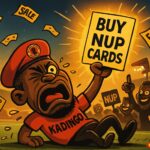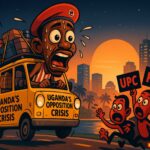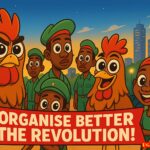Uganda’s Political Illusion: Exposing Managed Opposition, The Military Shadow & The Path to True People’s Power
In the polished television studios of Kampala, a carefully choreographed political spectacle unfolds nightly. Opposition figures debate, defectors announce new allegiances, and party officials trade heated accusations of betrayal. This is the theatre of Ugandan politics as presented on programmes like NBS Frontline—a drama of choice and change designed to captivate and distract. Yet, for the millions of Ugandans enduring a soaring cost of living, crumbling public services, and the ever-present shadow of militarised power, this performance rings hollow.
This analysis argues that the prevailing narrative of political competition in Uganda is a profound illusion. The fragmentation of parties like the National Unity Platform (NUP) and the Forum for Democratic Change (FDC) is not a sign of healthy democracy but a deliberate strategy of control. The regime thrives on a managed opposition, ensuring that dissent is fractured, inward-looking, and ultimately powerless to challenge the core structures of power. From the politics of patronage—where votes are exchanged for a mere chapati—to the centralised extraction of the nation’s wealth, the system is designed to perpetuate its own existence.
But a radical truth is emerging from the grassroots. Across Uganda, from the villages of Kaabong to the neighbourhoods of Kampala, people are bypassing this broken system entirely. Through community savings groups (SACCOs), farmer cooperatives, and acts of direct action, they are demonstrating that real power is not seized from the state but built from the ground up. This is a vision of a new Uganda, not delivered by politicians in Kololo, but constructed by the people themselves through mutual aid, solidarity, and an unwavering reclaiming of their own agency. This is the story of how the power of the people can dissolve the power of the state.

Here are 20 key points that expose the illusion and point towards a different way:
The Potemkin Village of Ugandan Politics: Why Changing the Dancer Doesn’t Change the Dance
In the bustling taxi parks and vibrant market stalls of Uganda, from the lively streets of Kisekka Market to the shaded trading centres of Arua, a common adage is often shared over a cup of steaming chai: “When two elephants fight, it is the grass that suffers.” For decades, we have been told this refers to the conflict between the ruling NRM and its opponents. But what if the truth is even more cynical? What if the elephants are, in fact, secretly in agreement on the most fundamental rule: that the grass must always be trampled? The recent theatrical defections and very public squabbles within parties like the NUP and FDC are not a sign of healthy competition. They are a carefully stage-managed illusion, a political Potemkin village designed to make us believe we have a choice, while the real power structure remains untouched and owned by one house.
This spectacle of opposition infighting is perhaps the most potent tool in the ruling party’s arsenal. It creates a thrilling, distracting drama where the population is encouraged to pick a side, to passionately debate which opposition leader is more genuine, which party is less corrupt, or which defector is more principled. We are led to believe that this is the battlefield where Uganda’s future will be decided. This is a grand deception.

In reality, all these parties, both old and new, are forced to play a game on a field designed, built, and refereed by the NRM. The rules of this game are not democratic; they are authoritarian. The state itself is not a neutral platform for governance but a weaponised tool for maintaining control. Therefore, any party that seeks to gain power through the state apparatus—by winning an election organised by an NRM-appointed electoral commission, contested under NRM-designed laws, and ‘secured’ by an NRM-loyal military and police—has already accepted the fundamental terms of its opponent. They are not challenging the system; they are merely asking for a turn to sit in the master’s chair.
This creates a cruel paradox for the genuine voter seeking change. Your anger at the rising cost of sugar, the crumbling health centre in your village, or the soldier’s boot on your neighbour’s neck is real. The opposition channels that justifiable anger and offers itself as the vehicle for redress. But by directing your energy into the electoral circus, they ultimately funnel your hopes back into reinforcing the very system that produces that misery. You are encouraged to invest your faith, your time, and your meagre resources into supporting a party that must, by the very nature of the game, eventually compromise or be crushed. The defection of a prominent MP from NUP to FDC or to a new vehicle like the PFF is not a seismic shift in ideology; it is often a personal calculation for relevance and survival within the confines of the same rigged game. It is rearranging the deckchairs on the proverbial sinking ship.
The radical alternative, then, is not to find a better leader to worship or a more honest party to follow. It is to fundamentally reject the idea that our liberation can be handed down by any politician in Kampala, no matter how well-intentioned they may seem. True power does not reside in Parliament; it resides in our ability to manage our own lives and communities directly.
Instead of looking to Kololo for salvation, we must look to our own communities. The real work of building a free Uganda happens not at the ballot box every five years, but in the daily acts of mutual aid and self-organisation:
When a community in Kasese pools resources to fix its own water source without waiting for a corrupt district official to embezzle the funds, that is real power.
When farmers in Mbale form a cooperative to bypass exploitative middlemen and get their produce directly to market, that is real power.
When residents in a Kampala neighbourhood organise a local watch to ensure their own security against petty crime, independent of a police force that only serves the powerful, that is real power.
These are not just survival strategies; they are the seeds of a new society growing within the shell of the old. They are based on a simple, powerful principle: we know what our problems are, and we are best placed to solve them ourselves, together, without a boss or a politician dictating the terms.
The infighting among the opposition elites is a distraction from this profound truth. It is a show designed to keep us believing that the current structure is the only game in town. Let us see it for what it is: a fight over who gets to control the chains, not a debate about how to remove them. Our duty is not to choose a better master, but to realise that we never needed masters in the first place. Let us stop watching the elephants fight and instead, tend to our own grass, until it grows so strong and resilient that it can no longer be trampled.
The Shepherd’s Game: How Dividing the Flock is a Strategy of Rule
A common adage whispered in the villages of Luwero and the bustling taxi parks of Kampala goes, “A single stick is easy to break, but a bundle of sticks is strong.” For any shepherd who wishes to control the flock, the first and most crucial task is to ensure the sticks never form that bundle. The constant fragmentation of Uganda’s political opposition—the defections, the bitter public spats, the formation of new, smaller parties—is not a sign of a vibrant democracy. It is not an accident of passionate politics. To the discerning eye, it reveals itself for what it truly is: a deliberate, calculated strategy of control, expertly managed by the regime to ensure it never faces a unified, credible threat.
This strategy is as old as power itself. A ruler facing a single, united front of dissent must contend with the full force of popular grievance. But a ruler facing ten squabbling factions need only play a simple, yet devastatingly effective, game: divide and conquer. The regime thrives on this division. By ensuring the opposition is perpetually fragmented and consumed with internal fights, it achieves several key objectives without ever firing a shot.
First, it dilutes the message of change. Instead of one powerful, clear alternative vision for the country, the public is presented with a cacophony of competing voices. One party speaks of federalism; another of social democracy; a new one emerges around a single personality. The average Ugandan, struggling to make ends meet, is left confused and disillusioned. Who truly represents change? This confusion benefits the status quo immensely, as a scattered opposition cannot build the critical mass of popular consensus needed to challenge a deeply entrenched system.
 Second, it exhausts the energy of dissent. The immense energy, resources, and passion that should be directed outward—toward challenging the regime’s failures on healthcare, education, and corruption—are instead turned inward. Opposition leaders spend their time giving press conferences against each other, organising rival rallies, and battling for donor funds and media attention. This is energy siphoned away from the real struggle. It is a political pressure valve, allowing steam to escape harmlessly rather than building up to a force that could power real change. The regime watches, content, as its rivals busy themselves with personal vendettas and political one-upmanship.
Second, it exhausts the energy of dissent. The immense energy, resources, and passion that should be directed outward—toward challenging the regime’s failures on healthcare, education, and corruption—are instead turned inward. Opposition leaders spend their time giving press conferences against each other, organising rival rallies, and battling for donor funds and media attention. This is energy siphoned away from the real struggle. It is a political pressure valve, allowing steam to escape harmlessly rather than building up to a force that could power real change. The regime watches, content, as its rivals busy themselves with personal vendettas and political one-upmanship.Most crucially, this management allows the regime to pose as the sole pillar of stability. Amid the chaos of opposition infighting, the ruling party can present itself as the only mature, organised, and stable force in the nation. Its message becomes: “Look at their chaos. We are the only ones who can guarantee peace and order.” This is a powerful narrative, especially to a population weary of instability. The very fragmentation of the opposition becomes a key propaganda tool for the regime, reinforcing its own justification for maintaining an iron grip on power.
But understanding this strategy is only the first step. The radical response is not to pour our energy into building a bigger, better opposition party to finally “win” their rigged game. That is still playing by the shepherd’s rules. The solution is to recognise that the entire parliamentary political arena is a trap designed to contain and neutralise dissent.
The real, unmanaged opposition does not exist in the plush offices of party headquarters in Kampala. It exists in the everyday actions of people who refuse to be divided, who build power from the ground up, independently of these orchestrated political dramas. It is found:
In the solidarity of communities that resolve their own disputes through elder councils, bypassing corrupt and biased courts.
In the resilience of informal trade networks where market vendors organise themselves to protect their livelihoods against police harassment and unfair taxes, creating their own system of mutual support.
In the farmer cooperatives that share resources and knowledge, refusing to be pitted against one another by middlemen who serve the interests of the powerful.
These are the bundles of sticks that cannot be easily broken. They represent a form of power that does not seek to capture the state but to render it increasingly irrelevant by building self-reliant, directly democratic communities.
The managed opposition spectacle is designed to make us look up, to the political stage, for a saviour. True power comes from looking sideways, to each other. Our strength has never been in which politician we choose, but in the networks of mutual aid and collective action we build ourselves. Let us stop watching the shepherd’s game and, instead, focus on building a flock so united and self-sufficient that it no longer needs a shepherd at all.
The Talking Heads of Kololo: When the Political Class Debates Everything But Your Life
There is an old saying, often shared with a knowing, weary look in the villages of Uganda: “When the elephants dance, the insects must be careful not to be crushed.” Nowhere is this more evident than in the polished studios of our national media, where the political elite—from the ruling party and its supposed opponents—gather for debates like the one on NBS Frontline. To the casual observer, it appears to be a fierce battle of ideas. But to the boda boda rider in Jinja, the market vendor in Owino, or the mother struggling to find medicine for her child in a dilapidated health centre in Kotido, the debate is a world away. It is a stark display of what is known as ‘elite capture’: a political class so utterly consumed by its own internal games of power, position, and prestige that it has become completely disconnected from the crushing realities of those it claims to represent.
The concerns that dominated that discussion were telling. They were not about the price of posho, the absence of midwives, or the teacher who hasn’t been paid for months. The heated arguments were about nominations, defections, and political manoeuvring. They debated who was more legitimate, who had the right to lead a party, and who had been wronged in the internal processes of their organisations. In essence, they were having a passionate argument about who gets to sit in which leather-backed chair in an air-conditioned office in Kampala. This is the ultimate privilege of the political elite: the luxury to treat politics as a career, a game of chess, while the majority of Ugandans experience it as a daily struggle for survival.
 This disconnect is not a minor oversight; it is the entire point of the system. The regime, and the opposition that plays by its rules, has a shared interest in keeping the conversation, here, in the realm of political gossip and personality clashes. Why?
This disconnect is not a minor oversight; it is the entire point of the system. The regime, and the opposition that plays by its rules, has a shared interest in keeping the conversation, here, in the realm of political gossip and personality clashes. Why?It Neutralises Real Issues: By keeping the public discourse focused on which MP defected to whom, they ensure that the foundational, systemic issues are never seriously addressed. A conversation about nominations is a safe conversation. A conversation about why a few individuals hold so much wealth while millions live in poverty is a dangerous one. The former maintains the status quo; the latter threatens to upend it.
It Creates a Political Class: Whether from the NRM, NUP, or FDC, these leaders form a distinct social class. Their primary loyalty is not to the people in the villages but to their position within the political structure. Their fights are internal squabbles within this class. The ‘people’ are merely a backdrop, a source of votes and political legitimacy to be mobilised during elections and forgotten immediately after.
It Makes Change Seem Impossible: When the only alternatives presented to you are different factions of the same out-of-touch elite, it breeds a deep cynicism. It makes you believe that all politics is just this—a self-serving game for the powerful. This convinces people to disengage, ensuring that the system faces no challenge from a organised and confident populace.
But there is a radical, simple truth we must reclaim: the legitimacy of a leader does not come from a party nomination certificate. It comes from the daily, lived experience of the community.
 True leadership is not debated in television studios; it is demonstrated in action, in solidarity, and in shared struggle. It is the community health worker who volunteers to care for her neighbours when the government clinic has no drugs. It is the village elder who mediates a land dispute fairly, without demanding a bribe. It is the youth group in a slum that organises to collect its own rubbish because the city council has failed them.
True leadership is not debated in television studios; it is demonstrated in action, in solidarity, and in shared struggle. It is the community health worker who volunteers to care for her neighbours when the government clinic has no drugs. It is the village elder who mediates a land dispute fairly, without demanding a bribe. It is the youth group in a slum that organises to collect its own rubbish because the city council has failed them.These are the people who are actually solving Uganda’s problems, not the politicians arguing on NBS. They are building power from the bottom up, based on mutual aid and direct action, not waiting for permission or a political appointment from above.
The elite’s debate is a distraction. It is a spectacle designed to make you feel like a spectator in your own country’s future. Our power lies in turning away from this screen and towards each other. Our strength is in our communities, in our ability to organise our own affairs based on our needs, not the ambitions of politicians. Let us stop listening to the elephants debate how to dance and instead, focus on building a world where their dancing can no longer crush us.
The Poisoned Well: How Corruption Turns Politics into a Get-Rich-Quick Scheme
There is a piercingly sharp adage often spoken in the dry, sun-baked villages of Karamoja, but understood by everyone across Uganda: “A fish rots from the head down.” Nowhere does this rottenness reveal itself more clearly than in the open secret of our political nomination processes. The constant, wearying allegations of bribery—where aspiring MPs and councillors must pay colossal sums to simply be considered as a candidate—are not mere instances of individual moral failure. They are a devastating symptom of a entire system poisoned at its source. This practice reveals a simple, brutal truth that every Ugandan intuitively knows: within the current political framework, power is not viewed as a tool for service; it is seen as the primary gateway to personal wealth and status. This corrupt logic is not confined to State House; it is the lifeblood of a system that infects every level of our society, from the ministries in Kampala down to the very lowest village council (LCI).
To understand this is to see the entire political machine for what it truly is: a protection racket disguised as governance. The exorbitant price tag on a party nomination is not a fee; it is an investment. Those who pay it are not altruistic souls; they are businesspeople calculating a return. They invest in a political position much like one would invest in a lucrative business venture, expecting to recoup their initial capital many times over through embezzlement, kickbacks from contractors, and the outright sale of public services that should be free. This is why the debate in elite circles is never about if this happens, but only about who is doing it. The entire structure is built on this foundational corruption.
This “currency of corruption” creates a vicious, inescapable cycle that strangles genuine progress:
It Excludes the Honest: The first and most obvious casualty is the competent, community-minded individual who lacks millions to bribe party officials. They are systematically filtered out before the race even begins. The system is explicitly designed to favour the wealthy and the connected over the skilled and the sincere.
It Indebts the Winner: The candidate who pays to win now enters office with a massive debt, both financial and political. They are not beholden to the voters who elected them; they are beholden to the party bosses who sold them the ticket and the moneylenders who financed the bribe. Their every vote in parliament, every tender they approve, will be influenced by the need to pay back these debts. Service to the public becomes an impossible, distant concern.
It Justifies More Plunder: To repay the debt and turn a profit, the newly elected official must now plunder the very resources meant to serve their constituents. The money for a new school borehole, for textbooks, or for clinic drugs becomes their target. This transforms every government programme into a potential feeding trough. The rot from the head quickly spreads to every limb of the body politic.
It Normalises the Abuse: At the village level, this logic trickles down with devastating effect. The local councillor, seeing their MP drive a new Prado TX, learns that this is simply “how things are done.” They then begin to monetise their own tiny sphere of influence—charging citizens for simple services, selling letters of recommendation, or taking a cut from community projects. This shatters the last vestiges of community trust and makes a mockery of the idea of public service.
The radical conclusion we must draw from this is not that we need “less corrupt” politicians. The conclusion is that the very structure of representative politics—where power is centralised and placed in the hands of a few individuals—is inherently vulnerable to this disease. It creates concentrations of power that are too tempting to not be abused.
 Therefore, the solution cannot be found in replacing the rotten fish at the head. The entire pond needs to be drained. The alternative is to build societies based on direct community ownership and transparent, rotational responsibility.
Therefore, the solution cannot be found in replacing the rotten fish at the head. The entire pond needs to be drained. The alternative is to build societies based on direct community ownership and transparent, rotational responsibility.Imagine if the funds for a community project were held and managed directly by a committee of elected community members, with books open for all to see, and where those in charge rotated regularly. This removes the centralised “switch” that a single corrupt individual can flip for their own gain. It is about creating systems where power is distributed so widely that it cannot be easily bought or sold.
The bribery for nominations is the clearest sign that the political class views Uganda as a business to be milked, not a home to be nurtured. Our response should not be to beg for a better deal from these businessmen. It should be to by-pass their marketplace of corruption entirely. We must build our own systems of mutual aid and collective decision-making that are so transparent, so local, and so accountable that the currency of corruption becomes worthless. Our communities already have the skills, the knowledge, and the people. What we must shed is the illusion that we need these corrupt intermediaries to manage our lives for us. Let us stop trying to reform the rotten fish and instead, build a new world where such concentration of power—and the corruption it inevitably brings—simply cannot exist.
The Unseen Cage: The Boot on the Ground and the Fear in the Mind
There is a profound adage, passed down through generations in Uganda’s villages: “The eye that sees the threat does not sleep.” For many, this speaks to personal vigilance. But today, it describes a national reality: we are a nation that cannot rest, because the threat is no longer hidden or distant. It is present, in uniform, on every street corner. As one voice on the panel starkly stated, the most pressing issue is not which party wins a nomination, but the creeping militarisation of our entire public life. The soldiers and police, whose duty it is to protect citizens, have been transformed into the enforcers of a political order. Their presence at our meetings, their confiscation of our tents, and their silent, intimidating gaze at peaceful gatherings send a message more powerful than any campaign poster: that ultimate power in this land does not reside with the voters, the constitution, or the ballot box. It resides, ultimately, with the barrel of a gun.
This is what we call the Military Shadow: a permanent state of low-level fear where the instruments of state violence are no longer a last resort but a first response to any form of dissent or independent organisation. This shadow does not just fall on the political opposition; it falls on every single Ugandan who dares to think of gathering, organising, or speaking outside the narrowly defined channels approved by the state.
This militarisation serves several crucial purposes for those in power:
It Enforces the Rules of a Rigged Game: Elections, parliamentary debates, and court rulings are the theatre. They are the performance of democracy designed for international audiences. But the military and police are the backstage security, ensuring the performance never goes off-script. They are the guarantee that no matter how the people vote, the final outcome will never truly threaten the core interests of the ruling class. They are the embodiment of the phrase, “It is not the voting that matters, but the counting.” They ensure the count—of everything from votes to public opinion—always favours the powerful.
It Replaces Political Legitimacy with Coercion: A government that serves its people does not need to constantly remind them of its power. Its legitimacy is proven through service, security, and welfare. A regime that relies on soldiers to confiscate tents at a community meeting openly admits that it has no moral or social legitimacy. It has no persuasive argument or popular consent. Therefore, it must rely on the one language it speaks fluently: the language of force. It substitutes the consent of the governed for the compliance of the terrified.
It Colonises the Public Imagination: The most potent effect of the Military Shadow is psychological. It teaches people to self-censor, to scale back their dreams of change, and to accept the boundaries of what is “allowed.” When you see a soldier at a rally not to protect you, but to watch you, you internalise that gaze. You start to police your own thoughts and actions. This creates a population that is passive, disengaged, and fearful—the ideal subjects for an authoritarian system.
From a radical perspective, this reveals a terrifying truth: the Ugandan state is not a political entity; it is primarily a military one. Its foundation is not a social contract with the people, but a monopoly on violence. To seek change through its own institutions—like parliament or elections—is therefore a profound error. You cannot dismantle a prison using the tools and blueprints provided by the jailer.
So, what is to be done? The answer lies not in confronting the gun directly—that is a battle fought on their terms, which they will always win—but in making its power irrelevant.
This means building power in ways that the military cannot easily see, control, or crush:
Building Deafening Silence: Organising mass non-cooperation, where the state’s demands are met with quiet, unified refusal. A soldier cannot arrest an entire village that simply refuses to acknowledge his authority to dictate their local affairs.
Creating Uncontrollable Networks: Developing decentralised, community-based systems of mutual aid—like food sharing, security groups, and education—that operate independently of state structures. How does a soldier confiscate a tent that was never put up, because the meeting happened in a hundred different homes simultaneously?
Withholding the Fuel of Legitimacy: Understanding that the regime craves not just our obedience, but our performance of respect. Denying them this spectacle—turning our backs, refusing to cheer, and going about our business as if their announcements were nothing but noise—starves them of the legitimacy they desperately need.
The Military Shadow is real. But shadows have no power in the light. Our task is to create that light by building communities so resilient, so united, and so self-reliant that the shadow of the gun fades into irrelevance. Our power does not lie in challenging their force with force. It lies in building a world where their force has nothing left to control. Let us stop looking at the barrel of the gun and start looking at each other, remembering that while they have the weapons, we have the numbers, the land, and the ultimate power to simply stop obeying.
The Country as a Commercial Enterprise: When Bloodline Replaces the Public Good
A deeply insightful adage from the heart of the Buganda kingdom speaks to the heart of our current predicament: “Obwaami tebubatizibwa,” meaning “Leadership is not inherited.” This wisdom, forged over centuries, understands that the right to lead a community is not a genetic trait passed down like eye colour or height; it is a sacred trust, earned through wisdom, service, and the consent of the people. Yet, the increasingly open discussion around the First Family and the political manoeuvring of its members reveals a starkly different, and terrifying, reality. Ugandan politics is shedding any remaining pretence of being a public service and is instead behaving like a monarchy, where power is treated as a private family asset to be preserved and handed down to the next generation. The state, with all its institutions, treasury, and armed forces, is no longer being treated as a public trust for the benefit of all citizens. It is being managed as a private estate, and we, the citizens, are being treated as mere tenants on our own land, or worse, as the livestock.
This transformation of the state into a family business is the ultimate expression of a system built not on principle, but on personal rule. It represents the final stage of a process where every public institution—the army, the parliament, the civil service—is hollowed out and repurposed to serve not the national interest, but the security and wealth of a single, increasingly hereditary, clique.
This “family business” model operates on a simple, brutal logic:
The State as a Revenue Stream: Just as a family would manage a profitable enterprise, the institutions of government are used to generate and funnel wealth. Tax revenues, natural resources, and international loans are treated not as public funds for building roads and hospitals, but as the personal income of the ruling consortium. National budgets resemble household accounts for the First Family, with allocations made to security and patronage networks to ensure the “business” remains secure, and its key supporters remain paid.
Succession Planning, Not Democratic Transition: The fierce political debates are no longer about ideology or policy for the good of the country. They are about succession planning. The key question within the elite circles is not “what is best for Uganda?” but “who will be next to hold the keys to the estate?” This reduces the entire political landscape to a family drama, where different factions within and connected to the family jostle for position, and where potential rivals from outside the bloodline are systematically neutralised or co-opted.
The Erosion of All Other Institutions: For a family to maintain total control, all other centres of power must be weakened. An independent judiciary is a threat. A non-partisan military is a threat. A vibrant civil society is a threat. A free press is a threat. Therefore, each must be brought under the control of the “family business,” led by loyalists, and turned into a department for protecting the brand and silencing complaints. This ensures no other “company” can compete.
From a radical perspective, this exposes the greatest lie of all: that we can change this system by voting for a different manager. You cannot fix a problem that is fundamental to the design of the structure itself. The problem is not just the current CEO of the “Uganda Ltd.” family business; the problem is that the nation has been turned into a private company in the first place.
Electing a new opposition leader to be the new chairman of this same corrupt board will not dismantle the company structure; it will merely put a new face on the same exploitative enterprise.
 Therefore, the solution is not to find a better family to run the estate. The solution is to abolish the concept of the estate altogether.
Therefore, the solution is not to find a better family to run the estate. The solution is to abolish the concept of the estate altogether.Our energy should not be wasted on the futile drama of the family succession. Instead, it must be directed toward:
Building Community Sovereignty: Empowering villages, neighbourhoods, and districts to manage their own resources, security, and justice directly. When a community controls its own water source, harvest, and security, the decrees from the “family estate” in Kampala become increasingly irrelevant.
Creating a Culture of Collective Stewardship: Rejecting the idea that any one person or family has a divine right to rule. Reviving the ancient principle that leadership is a temporary, rotational responsibility bestowed by the community, not a hereditary right claimed by a dynasty.
Withholding Our Labour and Consent: The “family business” has no power without our compliance. Its wealth comes from our taxes, our labour, and our resources. By building alternative economies of mutual aid and co-operatives, we can starve the beast and nourish our own communities.
The ambition is not to capture the throne room. It is to tear down the palace walls and use the stones to build stronger homes for everyone. We must stop watching the family drama and focus on the practical work of making their power obsolete. Our future will not be found in who sits in State House, but in the quiet, determined work of communities taking back their power, their resources, and their right to manage their own affairs. The kingdom is theirs. The land, and the future, remain ours.
The Snake That Sheds Its Skin, But Not Its Venom: When the Opposition Becomes the Mirror
There is a powerful adage from the banks of the Nile that warns: “Be careful when fighting a monster, lest you become one.” For years, parties like the National Unity Platform (NUP) presented themselves as the righteous warriors in this very fight, channelling the deep, legitimate frustrations of millions of Ugandans into a formidable wave of popular discontent. They spoke the language of change, justice, and liberation from a system everyone knew was rotten to its core. Yet, in a cruel and devastating twist, these very parties now stand accused of replicating the very tactics they once so passionately denounced—nepotism, opaque vetting, bribery, and the ruthless silencing of dissent. This is not a simple failure; it is a profound betrayal that reveals a bitter truth about the nature of centralised power itself: the problem is not just the people in charge, but the very chair they are fighting to sit on.
 This failure is not an accident of personality or a minor lapse in judgement. It is the predictable, almost inevitable, result of trying to beat a system by its own rules. The current political structure is not a neutral arena; it is a carefully designed trap. It is a game of monopoly where one player already owns all the hotels on the board. Any new player who sits down to play, no matter how pure their intentions, is forced to use the same toxic currency and abide by the same rigged rules. The system is designed to corrupt, to co-opt, and to assimilate any challenge into its own dysfunctional logic.
This failure is not an accident of personality or a minor lapse in judgement. It is the predictable, almost inevitable, result of trying to beat a system by its own rules. The current political structure is not a neutral arena; it is a carefully designed trap. It is a game of monopoly where one player already owns all the hotels on the board. Any new player who sits down to play, no matter how pure their intentions, is forced to use the same toxic currency and abide by the same rigged rules. The system is designed to corrupt, to co-opt, and to assimilate any challenge into its own dysfunctional logic.The accusation that NUP is now practising NRM-style politics reveals several devastating truths:
The Seduction of the Master’s Tools: The opposition, upon gaining a measure of influence, did not dismantle the tools of oppression; it simply seized them. It discovered that the methods of the NRM—patronage, strongman leadership, and backroom deals—were effective for maintaining control and discipline within their own organisations. In seeking to build a machine capable of defeating the NRM, they inadvertently built a mirror image of it. They adopted the master’s tools to dismantle the master’s house, and in doing so, began to rebuild an identical one.
The Lie of “Taking Power”: The entire project was based on a fatal assumption: that the key to change is to “take state power.” This goal forces every aspiring movement to become a centralised, top-down hierarchy capable of contesting elections and administering the state. In the process, it must make compromises, concentrate authority in a few hands, and make alliances with corrupt power brokers—all of which poison the original ideals. The desire to “take power” forces movements to become what they claim to oppose.
The Abandonment of the Grassroots: The energy that propelled these parties to prominence came from the streets, the villages, and the slums. But once the focus shifted to capturing parliamentary seats and political offices, that grassroots energy became merely a tool to be used during campaigns. The daily struggles of the people—the cost of sugar, the lack of medicine—were forgotten, replaced by the internal squabbles of the new political elite in Kampala. The leaders became detached, and the movement lost its soul.
From a radical perspective, this failure is our most important lesson. It proves, once and for all, that liberation cannot be delivered from the top down by a new set of rulers.
The answer is not to find more honest “change agents” to vote for. The answer is to stop looking for saviours in State House and start recognising the power we hold in our own hands and communities.
This means:
Rejecting the Saviour Complex: We must utterly abandon the dangerous idea that a single leader or political party will rescue us. This mentality makes us passive and waiting, instead of active and building.
Building Uncorruptable Structures: We must invest our energy in creating community-led organisations that are horizontal, transparent, and rotational. A community health project managed by a rotating committee with open books cannot be corrupted in the same way a ministry headed by a single powerful minister can.
Learning from the Betrayal: The failure of NUP is not a reason to despair; it is a vaccination. It teaches us that any movement that asks for our blind loyalty, that concentrates power, and that is not transparent from its very foundation, is destined to betray us.
The snake may shed its skin, appearing new and shiny, but its nature remains the same. Our task is not to find a better snake. Our task is to change the entire ecosystem so that such venomous creatures can no longer thrive. Let us stop pouring our hopes into parties that merely mimic our oppressors and instead, channel our energy into building our own power from the ground up—power that is collective, accountable, and forever rooted in the needs of our communities, not the ambitions of politicians.
The Great Ugandan Illusion: Why Elections Are a Carnival of Distraction
There is an old adage, often muttered in the queues for paraffin or in the slow grind of Kampala traffic: “The fool is happy when the circus comes to town, but does not see he is the main act in the show.” Nowhere is this wisdom more brutally applicable than to the grand, five-yearly spectacle we are told is the foundation of our democracy: the general election. From a radical perspective, that values substance over ceremony, elections are not exercises in accountability or genuine choice. They are phenomenally expensive, often violent, theatrical productions designed to achieve one primary goal: to provide a thin veneer of legitimacy to a predetermined outcome, all while draining communities of their resources, their energy, and ultimately, their hope.
 Think of it not as a democratic process, but as a carnival. For a few dizzying months, the country is saturated with colour, noise, and promise. Convoys roar through dusty villages, throwing out t-shirts and coins. Giant posters of smiling faces promise a future of milk and honey. Rallies blast music and fiery speeches. It is a thrilling distraction, a powerful illusion of change and participation. But when the last vote is (mis)counted and the carnival packs up and leaves town, the people are left standing amidst the litter and the debt, realising the thrilling show was just that—a show. The real rulers never left the stage; they merely directed the performance.
Think of it not as a democratic process, but as a carnival. For a few dizzying months, the country is saturated with colour, noise, and promise. Convoys roar through dusty villages, throwing out t-shirts and coins. Giant posters of smiling faces promise a future of milk and honey. Rallies blast music and fiery speeches. It is a thrilling distraction, a powerful illusion of change and participation. But when the last vote is (mis)counted and the carnival packs up and leaves town, the people are left standing amidst the litter and the debt, realising the thrilling show was just that—a show. The real rulers never left the stage; they merely directed the performance.This spectacle serves a number of crucial functions for those in power:
The Manufacturing of Consent: The regime understands that naked force is expensive and unstable. It is far more efficient to make people believe they have chosen their leaders. Elections provide this crucial illusion. By going through the motions—campaigning, voting, tallying—the system creates a myth of public approval. It allows the victor to point to the process and tell the world, and the populace, “You see? They chose me.” This manufactures a false consent, making the resulting rule seem legitimate even when it is not.
The Drainage of Community Resources: An election is an enormous economic sinkhole. Imagine the collective resources—the billions of shillings spent on posters, vehicles, rallies, and bribes—that are utterly wasted in this spectacle. This is wealth that could have been used by communities to dig a borehole, stock a drug shop, or fund a seed cooperative. Instead, it is siphoned out of local economies and into the pockets of printing companies, security firms, and political operatives. It leaves communities poorer, both financially and spiritually.
The Channeling of Energy into Harmless Avenues: Popular discontent is a powerful force. The spectacle of elections cleverly channels this energy away from direct action and into the dead end of electoral politics. Instead of organising a community to fix a road themselves, people are told to wait for a candidate who promises to do it. Instead of building local power, they are encouraged to pour all their passion into cheering for a national saviour. This redirects genuine revolutionary potential into the safe, manageable confines of the ballot box, where the outcome can be controlled.
A Pretext for Violence and Intimidation: The campaign period provides the perfect cover for the state to deploy violence and intimidation on a mass scale. The presence of military and police on the streets is justified as “keeping order” during the elections. Abductions, beatings, and harassment are framed as part of “heated campaigns.” The spectacle normalises the presence of armed force in civilian life, further entrenching the Military Shadow.
Therefore, the radical conclusion is not to try and make elections “free and fair.” The entire event is designed to be unfair. Its very structure—centralised, top-down, and easily manipulated—is the problem.
The alternative is not to abandon politics, but to redefine it entirely. It is to shift our focus from the spectacular carnival that happens every five years to the quiet, daily work of building autonomous community power.
This means:
Ignoring the Circus: Refusing to invest our passion, our hope, and our meagre resources in the electoral spectacle. Recognising that the posters, the convoys, and the rallies are a form of political advertising for a product that does not exist.
Building Permanent Power: Investing our energy in year-round, permanent organisations: community assemblies, neighbourhood councils, farmer co-operatives, and tenant unions. These are structures that cannot be rigged or bought off every five years.
Practising Direct Accountability: Creating systems where leaders are delegates from the community, recallable at any moment, and who report back directly to weekly or monthly community meetings. This is real, daily accountability, not the theatrical kind offered by a ballot paper.
The election carnival is designed to make us feel like participants in a democracy. In truth, we are the audience for a dictatorship’s publicity campaign. Our power does not lie in choosing a new ringmaster for the circus. It lies in turning our backs on the big top, walking away, and getting on with the serious, dignified work of building our own community, on our own terms, without asking for permission from the clowns in the centre ring. Let us stop being the fools in the show and become the architects of a new reality, one that exists long after the carnival has left town for good.
The Cultivated Field of Misery: Why Poverty is a Political Tool
There is a piercing adage, born from the relentless toil in the gardens of Mbale and the fishing shores of Lake Victoria: “A man drowning in a swamp cannot refuse the hand of the one who pushed him in.” This chilling wisdom cuts to the heart of the political economy of Uganda. To see poverty as a simple failure of policy is to miss the point entirely. For the political class, widespread and desperate poverty is not a problem to be solved; it is a strategic resource to be managed. It is the most fertile field in which they cultivate their power. A population consumed by the daily struggle for survival—for a single chapati, a day’s school fees, a dose of malaria medicine—is a population that is easier to manipulate, control, and ultimately, betray with the smallest of handouts during the campaign season.
This creates what can only be called The Poverty Industry. This is not an industry that produces goods, but one that produces and maintains dependency. Its factory floor is the entire nation, and its product is a compliant, desperate citizenry. The politicians are not incompetent managers of this factory; they are its brilliant and ruthless CEOs, because the system is working precisely as intended for them.
This industry operates on a cruel and simple business model:
Manufacturing the Crisis: The system is designed to keep public services—healthcare, education, agriculture extension—chronically underfunded and dysfunctional. This is not an accident. A mother who cannot get free treatment for her sick child at a government health centre becomes a desperate potential voter who will listen to any politician promising to personally intervene and pay the bill at a private clinic. The state’s failure creates a market for political patronage.
The Illusion of the Benefactor: During elections, the politician arrives not as a public servant accountable for fixing the broken system, but as a benevolent philanthropist. The handout of a few kilograms of sugar, a jerrycan of oil, or a promise to pay school fees is not charity. It is a transaction. It is a calculated down payment on a vote, designed to prove that the politician—not the community itself—is the source of sustenance and salvation. This reinforces the toxic idea that survival comes from above, not from our own collective strength.
Killing Ambition for Autonomy: A community that is self-reliant is a political threat. A cooperative that successfully markets its own coffee beans without a middleman does not need the MP. A village that pools resources to dig its own shallow well is less impressed by the politician who arrives promising water. Therefore, the system must keep people too poor, too tired, and too isolated to organise effectively. It must ensure that the energy required for collective self-help is exhausted by the daily grind of individual survival.
From a radical perspective, this reveals the deepest betrayal: the political class has a vested interest in our suffering. Our misery is the foundation of their power.
 Therefore, the solution is not to beg them for better policies or more effective handouts. That is like begging the arsonist to bring a bigger bucket of water. The only true solution is to bankrupt the Poverty Industry itself by making ourselves ungovernable through self-reliance.
Therefore, the solution is not to beg them for better policies or more effective handouts. That is like begging the arsonist to bring a bigger bucket of water. The only true solution is to bankrupt the Poverty Industry itself by making ourselves ungovernable through self-reliance.This means:
Rejecting the Chapati: Cultivating a collective dignity that refuses the small, poisonous handouts during elections. Understanding that the chapati offered today is a down payment on our exploitation for the next five years. It is the price tag they put on our sovereignty, and it is far too cheap.
Building Community Wealth Funds: Instead of relying on the MP’s handouts for a crisis, communities can create their own small solidarity funds. A weekly contribution from each household can create a pool of money for medical emergencies, school fees, or small business loans, controlled by the community itself. This makes the political patron obsolete.
Exposing the Strategy: Speaking openly about this “Poverty Industry” and naming it for what it is. When a politician offers a bribe, we must loudly say: “You kept this health centre broken so you could offer this paracetamol. We do not want your medicine; we want you to fix the centre for everyone, forever.”
The adage reminds us that the helping hand is often the one that created the danger. Our liberation lies not in grasping that hand, but in draining the swamp ourselves. We must become so resilient, so organised, and so mutually supportive that the politician’s chapati becomes an insult, not a lifeline. Our power is not at the ballot box; it is in our ability to collectively ensure that no one among us is so desperate that they would ever need to sell their vote for a meal again. Let us stop being the drowning victims and instead, band together to drain the swamp of its power over us for good.
The Single-Pillar Nation: Why Putting Faith in a Saviour is a Recipe for Collapse
There is an ancient adage, forged in the wisdom of Ugandan elders, that warns: “A house that stands on one pillar will fall.” For generations, this has been practical advice for builders. Today, it is the most urgent political wisdom we ignore. Our political culture is dangerously obsessed with the idea of the single, charismatic saviour—the one leader who will ride in on a white horse and deliver us from the tyranny of the NRM. We are encouraged to pour all our hopes, our faith, and our energy into individuals—a Besigye, a Bobi Wine, a Muntu. This is not just a strategic error; it is a dangerous trap that ensures our movements for change are fragile, temporary, and destined for collapse. It confuses celebrity for power and confuses a face for a movement. True, lasting power is never individual; it is always, and only, collective.
This “Saviour Myth” is perhaps the most effective tool used to maintain the status quo. It is a psychological cage that keeps us passive and waiting, instead of active and building. It operates on several destructive levels:
The Centralisation of Power: By focusing on one leader, we willingly re-create the very top-down power structure we claim to oppose. We give one person the authority to speak for us, to strategise for us, and to negotiate for us. This mirrors the presidentialism of the NRM and makes the entire movement vulnerable. If that one pillar is removed—through arrest, co-option, corruption, or simply failure—the entire house of cards collapses. The movement has no independent existence beyond its figurehead.
The Cult of Personality: The saviour model demands that we suspend our critical thinking. We are asked for loyalty, not questioning. Dissent within the movement is framed as betrayal, not as healthy debate. This stifles innovation and ensures that the leader’s weaknesses become the movement’s weaknesses. Their strategic blunders, personal flaws, or ideological inconsistencies become fatal liabilities for everyone who followed them.
The Disempowerment of the Collective: The myth teaches us that power resides in the saviour. Our role is merely to support, to cheer, and to wait for instructions. This disempowers the millions of talented, capable, and intelligent Ugandans who have the skills to organise their own communities. It tells the nurse, the teacher, the farmer, and the engineer that they are not the agents of change—only the chosen leader is. This wastes the immense potential of the people.
From a radical perspective, this is the ultimate trick: convincing the oppressed that their liberation must be gifted to them by a superior individual, rather than seized by their own collective hands.
The history of our opposition is a tragic cycle of this failure. A movement rises with a charismatic leader. The state neutralises that leader. The movement fragments, collapses, and enters a period of despair and infighting, waiting for the next saviour to appear. It is a draining, exhausting cycle that only benefits the regime.
The alternative is not to find a better, smarter, more incorruptible saviour. The alternative is to stop looking for saviours altogether.
This means a fundamental shift in thinking:
From Leader-Centred to Idea-Centred Movements: We must build organisations and networks that are dedicated to principles—like community self-rule, mutual aid, and direct accountability—rather than to the personality of a single individual. The idea must be bigger than any one person.
Building a Forest, Not a Single Tree: Instead of one giant party with a single leader, we need a million interconnected initiatives. A community health group here, a farmer’s cooperative there, a neighbourhood assembly elsewhere. A forest cannot be felled by cutting down one tree. This is a resilient, decentralised model of power that cannot be decapitated.
Understanding That We Are the Leaders We Wait For: The real “saviours” are the midwives in the health centre, the teachers under the tree, the elders resolving land disputes, and the youth organising clean-up activities. Every act of community care and mutual support is an act of building a new society. This is how we build a house on millions of pillars, so strong that no storm can ever knock it down.
The adage teaches us that a single pillar is a point of failure. Our liberation will not come from a single person in Kampala. It will come from all of us, in our villages and towns, realising that we already have the power within our communities to solve our problems. Let us stop waiting for a messiah and instead, become the collective architects of our own future. Let us build a house so strong and so multi-pillared that it will shelter generations to come, long after the names of today’s saviours are forgotten.
The River of People’s Anger, Diverted into the Elite’s Reservoir
There is a powerful adage from the slopes of Mount Elgon that speaks to a universal truth: “Water from the community spring should not end up watering only the chairman’s garden.” This simple, profound wisdom captures the exact tragedy that unfolds in Ugandan politics time and again. The energy, the passion, and the desperate hunger for change always, without fail, originates from the grassroots—from the cramped trading centres, the overworked hospital wards, and the sun-baked fields where the real work of Uganda is done. This is a powerful, flowing river of legitimate anger and hope. Yet, repeatedly, this river is deliberately diverted. It is channelled into the narrow, concrete drainpipes of political parties, only to be captured, stored, and used to water the luxurious gardens of a new political elite, who quickly become divorced from the very people who gave them power in the first place. This process is not a mistake; it is a sophisticated system of political theft.
This diversion and capture happens through a predictable, ruthless process:
The Harvest of Hope: A new political vehicle emerges, presenting itself as the authentic vessel for grassroots anger. It uses the language of the people, amplifies their grievances, and mobilises their energy. People invest not just their votes, but their meagre savings, their time, and their emotional hope into this project, believing it to be their own.
The Bait-and-Switch of Structure: Once the energy is mobilised, the party’s internal structure—often undemocratic and centralised—takes over. The passionate volunteer from the village is sidelined. Decision-making moves from open assemblies to closed-door meetings in Kampala hotels. The agenda shifts from the community’s needs (the cost of living, healthcare) to the party’s needs (winning elections, securing nominations). The grassroots are told to be foot soldiers, not generals; to follow, not to lead.
The Takeover by the Political Class: The party apparatus is then captured by careerists, businesspeople, and defectors from the old regime who see a new opportunity. They bring with them the old logic of politics: that power is a tool for personal enrichment and status. The original ideals are slowly suffocated by a culture of patronage, where loyalty to the party leaders is rewarded with positions, and dissent is crushed. The party becomes a business, and the grassroots become its customers.
From a radical perspective, this cycle proves a crucial point: any movement that seeks to centralise power—even for supposedly “good” reasons—will inevitably be captured by elites. The structure of a top-down political party, by its very design, is a filtering mechanism that excludes the humble and elevates the ambitious and the connected.
Therefore, the lesson is not to try and find a more “pure” political party. The lesson is to stop channelling our energy into these leaking vessels altogether.

We must learn to value the water—our collective energy—more than the irrigation system—the political party—that is designed to waste it.
This means:
Investing in Horizontal Structures: We must pour our energy into organisations that are inherently resistant to capture: community assemblies, neighbourhood councils, worker co-operatives, and tenant unions. These are structures where leadership is rotational, mandates are imperative, and recall is instant. Power is distributed, not concentrated.
Rejecting the “Voice” Narrative: We must reject the idea that we need a national political party to “give us a voice.” We have our own voices. The goal is not to find someone in Kampala to speak for us, but to build our own power locally so loudly that Kampala has no choice but to listen.
Building Permanent Power, Not Campaign Machines: Our community organisations must be permanent. Their work continues before, during, and long after the election carnival has left town. They should be focused on solving problems directly—fixing a road through communal labour, starting a community-owned drug shop—not on begging the state to do it.
The adage reminds us that the spring belongs to the community. We must stop letting politicians build pipelines from our spring to their private gardens. Our energy is ours. It is time we stopped giving it away to new masters and started using it to build our own power, on our own land, for our own benefit. Let us keep the water in our own soil, to nourish our own roots, and watch our own gardens grow.
The Vampire State: How the Machinery of Government Sucks Uganda Dry
There is a stark, old adage from the cattle-keeping communities that speaks a brutal truth: “The shepherd shears the sheep for wool, but the butcher takes the whole beast for meat.” For decades, Ugandans have been told they are being gently “sheared” by a state that provides security, roads, and schools in return. But a closer look at the machinery reveals a far more sinister operation. The Ugandan state, as it is currently constructed, is not a shepherd; it is a butcher. Its primary purpose is not to serve the people, but to extract from them. It functions as a highly efficient, legalised tool for harvesting the wealth of the nation—our taxes, our land, our minerals, and our labour—and funnelling it upwards to a small, connected network of rulers, military officials, and their business partners. The people are not the beneficiaries of this system; we are the raw material.
This is not a case of a few “bad apples” corrupting a noble system. The system itself is designed for extraction. Every institution, every law, and every official ultimately serves this core function:
The Tax Collector as a Tribute Agent: The taxes deducted from a teacher’s meagre salary or the levies forced from a market vendor are not a fair contribution to a shared public good. They are a form of tribute, paid to a ruling class that offers little in return. This money is not primarily used to improve schools or markets; it is used to fund a vast security apparatus to protect the rulers and to finance a patronage system that buys the silence and loyalty of the elite.
The Land Grab as Official Policy: The state’s power to claim “public interest” or to hand out land titles is one of its most powerful extractive tools. From the forests of Mabira to the ranchlands of Kiruhura, communities are violently dispossessed of their ancestral land. This land is then gifted to foreign investors or well-connected generals, not for national development, but for private profit. The state’s courts and police are then used to evict and silence the original inhabitants, proving that the law protects the interests of the extractors, not the rights of the people.
The Myth of “Development”: Large-scale infrastructure projects—dams, mines, industrial farms—are often presented as national development. In reality, they are frequently sophisticated extraction schemes. The contracts benefit foreign corporations and their local partners, the minerals are exported for others’ profit, and the environmental and social destruction is left for the local communities to bear. The state facilitates this by providing the legal cover and the military muscle to suppress any resistance.
From a radical perspective, this changes everything. It means that lobbying this state for better services or “good governance” is like begging the butcher to be more gentle when he takes your cow. It misunderstands his entire profession. The state is not malfunctioning; it is performing exactly as it was designed—to concentrate wealth and power at the top.
Therefore, the goal cannot be to try to become the new manager of this extraction machine. The goal must be to dismantle its power over our lives and build alternatives that make it irrelevant.
This means:
Withholding the Fuel: Finding ways to collectively resist and reduce the extraction. This can mean supporting the informal economy that operates outside its tax net, or communities physically resisting land grabs and refusing to be moved.
Building Community Self-Reliance: Creating our own systems for meeting our needs that bypass the state entirely. Community-owned seed banks, volunteer-run health clinics, and neighbourhood security groups are all acts of building independence from the extractive system.
Reclaiming the Narrative: constantly exposing the state not as a benefactor, but as a predator. We must tell the stories of the stolen land, the embezzled funds, and the communities left with nothing so that everyone understands the true nature of the machine.
The adage reminds us that there is a world of difference between a shearer and a butcher. We must stop believing we are dealing with the former and organise ourselves against the reality of the latter. Our future depends not on reforming the butcher’s shop, but on building our own independent farms where we control the produce, from the soil to the table. Our resources are ours. It is time we stopped handing them over and started using them for our own communities, by our own hands.
The Quiet Revolution: How Ugandans Are Already Building the Future From Below
There is a powerful, enduring adage whispered in the villages of Uganda that carries a profound truth: “If you want to go fast, go alone. If you want to go far, go together.” For too long, we have been told to look up—to the state, to politicians, to distant saviours—for solutions to our problems. We have been taught that we are helpless without permission from above. Yet, if we pause and look around at our own communities, we see a quiet revolution already in bloom. Across the country, people are instinctively organising themselves, not waiting for a circular from Kampala. From community savings groups (like SACCOs and Village Savings and Loan Associations – VSLAs) to farmer cooperatives and neighbourhood watch schemes, Ugandans are demonstrating a simple, radical truth every single day: we already have the capacity, the wisdom, and the will to manage our own affairs.
These are not just survival mechanisms. They are living proof of a different way of organising society—one based on mutual aid, direct democracy, and collective responsibility, rather than hierarchy, extraction, and control.
Let us examine these everyday acts of self-rule:
The SACCOs and VSLAs: A People’s Treasury: While the state talks of grand projects and foreign debt, ordinary Ugandans are building their own financial systems. In these groups, people pool their meagre resources and give loans to each other based on trust and collective agreement, not collateral from a bank. There is no corrupt official to embezzle the funds. The books are open for all to see. This is a direct, practical example of how we can manage capital collectively, for the benefit of the community, without a parasitic political class taking a cut.
The Farmer Cooperatives: Rejecting the Middleman: When farmers come together to form a cooperative, they are doing more than just bargaining for a better price for their coffee or maize. They are seizing control of the means of distribution. They are cutting out the exploitative middlemen who are often connected to the very politicians who claim to help them. This is economic self-determination in action—a declaration that those who till the land should control the fruit of their labour.
Neighbourhood Watch (aka “Community Policing”): This is perhaps the most powerful example. When residents organise to keep their own streets safe, they are proving that security does not come from a distant, often brutal, police force. It comes from neighbours knowing and looking out for each other. This is genuine security, rooted in community trust, not fear of state violence. It makes the centralised police force look like what it often is: an occupying army, not a public service.
From a radical perspective, these are not just “projects.” They are the embryonic cells of a free society. They prove that the expertise for governance exists right here, among us. We do not need a ministerial decree to solve our problems.
The lesson from this is not to ask the state to support these initiatives. The lesson is to recognise their immense political power and to multiply them everywhere.
This means:
Conscious Expansion: We must actively create more of these organisations—community health groups, parent-led education committees, water management collectives—until they form a dense, unbreakable network of mutual support that covers the entire country.
Federation and Solidarity: These groups should not remain isolated. They can link together, forming networks where villages and regions can share resources and knowledge directly, bypassing the central government entirely. A farmers’ cooperative in Lira can trade directly with a savings group in Mpigi.
Withdrawing Legitimacy: Every time we solve a problem ourselves through a SACCO or a cooperative, we strip the state of its reason for existing. We prove that we do not need their inflated, corrupt ministries. We make them obsolete.
The adage teaches us that going together is how we go far. Our politicians go fast alone, in their convoys, towards personal wealth. Our power lies in going together, at our own pace, towards collective freedom. Let us stop waiting for a invitation to the table in a room where we are on the menu. Let us instead recognise that we are already building our own tables, in our own communities, and feasting on the fruits of our own labour. The future is not being debated in parliament; it is being built daily in our villages, by our own hands.
The Tyranny of Distance: Why Power Must Be Brought Back Home
There is a deeply insightful adage, often shared amongst elders resolving a dispute under the shade of a tree: “The man who feels the heat of the sun knows where to find the shade.” This simple wisdom speaks to a fundamental truth about knowledge and power. The current centralised system of governance in Uganda operates on the opposite, absurd principle. It insists that a minister or technocrat sitting in an air-conditioned office in Kampala—who has never faced the scorching sun of Kaabong or tasted its muddy water—is best placed to make decisions about a water source there. This is not just inefficient; it is a form of tyranny. Real, effective decision-making power must be pushed down to the lowest possible level—the village, the parish, the district—because that is where the knowledge, the stakes, and the solutions truly reside. This is not about administrative efficiency; it is about the fundamental right of people to manage their own lives.
Centralisation is not just a way of organising government; it is a way of dispossessing people of their autonomy. It is a system designed to create dependency, foster ignorance in the centre, and strip communities of their confidence and capability.
The argument for radical decentralisation is built on unshakeable logic:
Local Knowledge is Superior Knowledge: The people of Kaabong do not need a hydrological survey from Kampala to tell them where their water source is. They know the land, the seasons, and the history of their water points. A centralised ministry will allocate funds for a borehole based on a spreadsheet, often in a politically connected area. The community itself would prioritise based on actual, daily need, ensuring the most vulnerable get served first. They feel the heat, so they know where the shade is.
Accountability is Face-to-Face: It is easy for a Minister to ignore a letter from a village in Kaabong. It is impossible to ignore your own uncle, neighbour, or community elder standing in front of you at a weekly parish meeting, asking you to account for the funds collected for the borehole. When power is local, leaders cannot hide. They live among the consequences of their decisions. This is real, immediate accountability that no national election can ever provide.
It Ends the Politics of Patronage: The current system forces communities to beg Kampala for what is rightfully theirs. This turns citizens into supplicants and politicians into benefactors. It is the source of the poisonous “chapatis for votes” culture. If a community in Kaabong could control its own local resources and budgets directly, it would have no need to beg a visiting MP for help. It would dismantle the entire patronage machine that keeps the centralised system in power.
From a radical perspective, this is the core of liberation: the dismantling of monopolised power. The goal is not to decentralise the state; it is to make the state’s role in local affairs redundant.
This means fighting for:
Community Control Over Resources: The right for a parish or district to manage its own water sources, forests, and land use, based on its own collective decisions, not on a permit from a distant ministry.
Fiscal Autonomy: The power for communities to raise and spend their own revenues for their own priorities, with full transparency to their members, drastically reducing their dependency on corrupt and inefficient central government transfers.
Local Justice and Security: Supporting community-based conflict resolution and neighbourhood watch schemes that understand local contexts better than a police force that takes orders from Kampala and views every community as a potential threat to control.
The adage teaches us that those closest to a problem understand it best. Our current system is designed to ensure they are the last people consulted. Decentralisation is about more than devolution; it is about a fundamental transfer of power from the centre to the community. It is about declaring that the people of Kaabong are the undisputed experts on their own lives, their own needs, and their own future. Let us stop begging Kampala for permission to drink water and start building a country where every community holds the cup to its own lips. The power is not in the State House; it is in our own hands, in our own villages, waiting to be reclaimed.
The Poisoned Chalice: Why We Must Spit Out the Politics of the Belly
There is a piercing adage from the heart of Africa that every Ugandan knows in their bones: “The hand that receives is always beneath the hand that gives.” This is the brutal, unvarnished truth of the system of political patronage—the “Politics of the Belly”—that defines our public life. It is not merely corruption; it is a sophisticated culture of domination designed to keep us on our knees. To accept a politician’s money for your vote, to see your neighbour as a client to be bought or a rival to be outbid, is to willingly place your head beneath their heel. We must consciously, deliberately, and collectively reject this entire culture. It is a poison that dissolves the bonds of community and turns us into a nation of isolated beggars, fighting over scraps from the master’s table. Our liberation does not begin with capturing the State House; it begins with refusing the poisoned chalice offered to us during election time.

The “Politics of the Belly” is more than just bribery. It is a totalising system of control that operates on several destructive levels:
The Economics of Dependency: The handout of a few thousand shillings, a bag of sugar, or a promise of a job is not charity. It is a transaction designed to create a relationship of permanent dependency. It teaches us that our survival depends on the whims of the powerful, not on our own capacities or the strength of our community. It is a economic trap that keeps us poor and grateful for the very system that impoverishes us.
The Psychology of Inferiority: Every time we accept a bribe, we internalise a message of our own worthlessness. We are told, and we come to believe, that our voice, our dignity, and our future are only worth the price of a chapati. This psychological violence is more damaging than any single policy. It kills our ambition for autonomy and makes us complicit in our own oppression.
The Destruction of Social Fabric: This system is the ultimate tool of “divide and rule.” It turns community against community, neighbour against neighbour, as we are forced to compete for the attention and resources of the patron. It destroys trust and replaces solidarity with suspicion. It makes collective action impossible because it encourages us to see each other as rivals for patronage, not as allies in a common struggle.
From a radical perspective, rejecting this is the first and most fundamental act of rebellion. It is a declaration that we are not animals to be fed, but human beings to be respected.
 This rejection is not just a negative act; it is the positive act of building a new culture based on two powerful principles: Mutual Aid and Solidarity.
This rejection is not just a negative act; it is the positive act of building a new culture based on two powerful principles: Mutual Aid and Solidarity.Mutual Aid is the opposite of patronage. It is the practice of freely exchanging resources and services for mutual benefit. It is the community savings group (VSLA) where everyone contributes and everyone decides. It is the neighbour helping you roof your house, knowing you will help them in return. It is horizontal, reciprocal, and builds collective power.
Solidarity means understanding that my liberation is bound up with yours. It is refusing to be bought off when your neighbour is being evicted. It is recognising that the politician who buys your vote today will evict you from your land tomorrow. It is building relationships based on shared interest, not hierarchical submission.
This means taking concrete steps:
Collective Dignity Pacts: Communities making public pledges to refuse all political handouts, creating social pressure that makes it shameful to be bought.
Building Alternative Economies: Investing our time and resources in community-owned initiatives—farming co-ops, savings clubs, skill-shares—that make us less dependent on the parasitic political class.
Naming and Shaming: Openly and publicly calling out the politicians who try to buy votes and the individuals who enable them, breaking the silence that allows this culture to thrive.
The adage reminds us that the recipient is always subordinate. Our power lies in refusing to be the recipient. Let us stop stretching out our hands for coins and instead join them together with our neighbours’ hands to build a world where we are no longer beneath anyone. Let us reject the politics of the belly and embrace the politics of the community, where we are all fed by the fruit of our own collective labour, not by the crumbs from a thief’s table. Our dignity is not for sale.
The Battle for the Mind: Why Information is the Real Contested Territory
There is an old and profound adage that warns: “Until the lions have their own historians, the history of the hunt will always glorify the hunter.” For decades in Uganda, the hunter—the political regime—has maintained its power not only with guns and money but with a far more subtle and potent weapon: the control of information. It operates a sophisticated machinery of misinformation, distraction, and outright silence to keep the population confused, divided, and passive. The official story is a hunting trophy, mounted to celebrate the power of the hunter. But a new battle is underway, not for the State House, but for the mind. Our most powerful weapon in this fight is the truth, shared freely amongst ourselves. We can fight back by seizing the means of storytelling, supporting truly independent media, and becoming the historians of our own struggle.
The regime’s control is not just about censorship. It is a multi-layered strategy:
Flooding the Zone with Lies: By saturating the public space with propaganda, contradictory statements, and sensationalist gossip, they create a fog of confusion. When people cannot discern truth from fiction, they become cynical and disengage from politics altogether. This cynicism is a gift to the corrupt, as it guarantees no organised challenge can form.
Controlling the Narrative: The state and its allies dominate the major media platforms, turning them into echo chambers for official pronouncements. Opposition voices are framed as divisive, treacherous, or foreign agents. This control ensures that the regime’s perspective is the default, the “common sense,” while dissenting views are marginalised as radical or unpatriotic.
The Weaponisation of Division: Misinformation is carefully crafted to amplify ethnic, religious, and regional divisions. By turning communities against each other, the regime ensures we see each other as the enemy, rather than recognising the common source of our problems. A people divided by suspicion cannot unite in solidarity.
From a radical perspective, this reveals a crucial truth: power does not just reside in the army or treasury; it resides in the ability to define reality itself. Therefore, the struggle for liberation is, first and foremost, a struggle over information.
 This is not a call to take over the state broadcaster. It is a call to render it irrelevant by building our own independent networks of communication. This is a form of direct action against the regime’s control of our minds.
This is not a call to take over the state broadcaster. It is a call to render it irrelevant by building our own independent networks of communication. This is a form of direct action against the regime’s control of our minds.Our strategy must be to:
Become the Lions’ Historians: We must tell our own stories. This means using every tool available—from community radios in local languages to WhatsApp groups, social media, and word-of-mouth—to share what we are seeing and experiencing. Document police brutality. Share the real cost of living. Expose corruption in your local council. Your phone is a more powerful tool than you know.
Support and Create Independent Media: True independent media is not just another news outlet; it is a lifeline. Supporting platforms that prioritise people over profit, and facts over propaganda, is essential. But we must go further: we can create our own community newsletters, podcasts, and social media channels that report on issues the mainstream ignores.
Practice Critical Thinking and Verification: We must become a populace of sceptics. Question everything, especially the official story. Verify information before sharing it. Teach others to do the same. This turns us from passive consumers of information into active, critical investigators.
Build a Culture of Open Sharing: Information is power only when it is shared. Hoarding knowledge helps the powerful. We must create networks where information flows freely and quickly, warning each other of dangers, sharing strategies of resistance, and celebrating our victories. This is how we create a collective intelligence that can outmanoeuvre the state’s propaganda.
The adage teaches us that history belongs to those who write it. For too long, we have been characters in a story written by our hunters. It is time to pick up the pen—or the phone—and start writing our own history. Our story will not be one of helpless victims, but of resilient communities, of mutual aid, and of a quiet, determined refusal to be lied to. Let us break the regime’s monopoly on truth and create a cacophony of our own voices, so loud and so clear that the official story is drowned out for good. The most revolutionary act in an age of lies is to speak a simple, verifiable truth and to pass it on.
The Well vs. The Flag: Where Our True Loyalty Must Lie
There is a timeless adage, spoken in countless languages across our continent: “Water does not know borders; it simply seeks the common level.” This is a profound truth that cuts through the noise of partisan politics. For too long, we have been divided by artificial loyalties—to political parties, to flags, to individual leaders—who profit from our division. They ask us to fight for their colours while they share the spoils amongst themselves. But if we look to the earth, to our daily lives, we see a different, more powerful truth. Our real unity is not found in a party manifesto drafted in Kampala; it is found in our shared needs as human beings and communities: the need for clean water, for good schools for our children, for healthcare that doesn’t bankrupt us, and for peace in our neighbourhoods. These needs do not wear party colours; they are the common level that unites us all, regardless of who we voted for.
The politics of party loyalty is a trick, a deliberate strategy to keep us fractured. It is designed to make a person in Kasese see a person in Gulu not as a fellow Ugandan with the same struggles, but as a rival supporter of a different political tribe. This artificial division ensures we never recognise our collective power.
True, unbreakable unity is built on a different foundation—the foundation of material need and mutual interest.
Shared Needs Create Authentic Solidarity: A mother in a village in Busoga does not care about the political party of the mother in a village in Ankole when they are both standing in line at a health centre with no drugs. Their shared desperation creates an instant, authentic bond. That bond is a thousand times stronger than the abstract loyalty to a flag or a party. It is a unity forged in the fire of shared experience, not handed down from a political podium.
Community Problems Require Community Solutions: The challenge of a contaminated water source in a parish is not a “party” problem. It is a human problem. Solving it requires everyone’s effort—the skills of one household, the labour of another, the resources of another. When we come together to dig a protected well, we are practising a politics that is real and tangible. This shared work builds trust and proves that we can be the architects of our own salvation, without waiting for a party representative to come and campaign.
It Exposes the Elite’s Game: When we unite as communities around shared needs, we reveal the political class’s dirty secret: they have no real solutions. The MP who campaigns on a party ticket will show up when votes are needed, but will be absent when the community well runs dry. Organising around water, rather than party, exposes this failure and shifts power away from the politician and back to the people.
From a radical perspective, this is the key to building invincible power. Power does not come from aligning with a national party; it comes from organising locally around the things that immediately affect our lives.
This means we must actively:
Build Bridges, Not Fences: Deliberately seek out those you are supposed to see as “opposition” and find common ground. A Parents-Teacher Association (PTA) meeting is a perfect place to start. The quality of your children’s education is a unifying goal that should make party politics irrelevant.
Create Community Assemblies: Form regular gatherings—not sponsored by any party—where neighbours can discuss the issues that matter most: security, water, food prices, and school fees. Let these assemblies become the real decision-making bodies for the community.
Withhold Our Loyalty: Recognise that our loyalty belongs to our neighbours who look out for us, not to a distant politician who only appears at election time. Starve the parties of the blind loyalty they need to survive.
The adage reminds us that water, the source of life, ignores the borders humans draw. Our shared humanity and our shared needs are like that water. They are the common level that can wash away the artificial divisions drawn by the powerful. Let us stop saluting flags and start digging wells together. Let our unity be measured not by the posters we hang, but by the water we drink, the schools we build, and the health we share. Our community is our party, and its platform is our collective well-being.
The Sun and the Candle: How to Make Centralised Power Fade into Irrelevance
There is a profound adage that speaks to the heart of strategy: “You do not need to blow out someone else’s candle to make your own light shine.” For generations, the struggle for change in Uganda has been framed as a battle to blow out the regime’s candle—to “seize power” through elections or uprising, to occupy the State House, and to become the new rulers. This is a trap. It assumes the candle is the only source of light and that the goal is to possess it. But there is another way. The true goal is not to seize the candle but to become the sun. The aim is to build such brilliant, strong, self-reliant, and interconnected communities that the faint, flickering light of the centralised state—with its corruption, its brutality, and its irrelevance to daily life—simply fades into obscurity. We do not need to take their power; we need to make it pointless.
This is a radical shift in thinking. It moves us away from the doomed project of confronting a well-armed state on its own terms and towards the liberating project of building our own world right under its nose.
The current power structure is like a vampire; it feeds on our dependence. It exists because we turn to it for solutions, for security, for legitimacy. The strategy of dissolving power is to starve the vampire until it withers away from malnutrition. We do this by making ourselves ungovernable through self-reliance.
This involves building parallel systems that meet our needs directly:
Building Community Sovereignty: Imagine a parish that manages its own clean water source through a community-owned cooperative. It collects its own fees, maintains the pump, and handles disputes. What need does it have for a Ministry of Water that never delivers? The ministry’s power over that community has just been dissolved.
Creating a People’s Economy: Imagine a network of farmer cooperatives that bypasses middlemen and connects directly to markets in neighbouring districts, or community savings groups (VSLAs) that provide loans without needing a bank. The power of exploitative capitalists and state-connected cartels over our economic lives begins to dissolve.
Administering Our Own Justice: Imagine community-based mediation councils that resolve land and family disputes fairly, quickly, and without bribes. The power of a distant, corrupt, and slow court system becomes irrelevant to daily life. Its power is dissolved.
Federating for Strength: These self-reliant communities are not isolated. They can link together—a parish with a parish, a district with a district—forming federations for mutual aid and larger projects. This creates a powerful, bottom-up network of solidarity that can trade, share resources, and defend each other, making the top-down diktats from Kampala unnecessary.
From this perspective, the state does not need to be overthrown in a dramatic revolution. It can be made redundant through a million acts of quiet, daily construction.
This means:
Shifting Our Energy: Moving our focus away from the exhausting, theatrical drama of national politics and towards the practical work of building power in our own villages, parishes, and neighbourhoods.
Ignoring the Crown: Stop fetishising State House. Its significance diminishes every time a community solves a problem without writing a letter to a minister. Our goal should be to make the position of President irrelevant to the well-being of our people.
Celebrating Autonomy: Every community-led initiative, from a neighbourhood watch to a maize milling cooperative, is a act of dissolving centralised power. Each one is a victory to be celebrated and replicated.
The adage teaches us that our light does not depend on extinguishing another’s. The regime’s power is a candle—a weak, artificial light that creates more shadow than illumination. Our power, built from the ground up through mutual aid and self-reliance, is the sun. We do not need to fight the darkness; we need to become so bright that the darkness ceases to exist. Let us stop trying to capture the candle and instead focus on building a dawn so bright that no one will remember its faint, flickering flame.
The Path is Made by Walking: We Are the Architects of a New Uganda
There is an old and powerful adage that has guided travellers on our continent for centuries: “The path is made by walking.” This means the way forward does not exist on a pre-drawn map held by those in power. It is created step-by-step by the choices and actions of ordinary people. The current system, with its corruption, its violence, and its empty promises, works tirelessly to make us believe that this is the only reality possible—that there is No Alternative. This is the biggest lie of all, designed to breed resignation and crush hope. But it is a lie. Another Uganda is not only possible; its foundations are being laid every single day. It will not be delivered to us by a politician on a podium. It will be built by us, from the ground up, in our daily acts of cooperation, mutual aid, and quiet resistance.
 The notion that we must wait for a saviour or a perfect political party is a form of self-imposed slavery. It outsources our agency and our future to a class of people who have consistently proven they do not have our interests at heart. It keeps us looking up, when the real source of power is all around us.
The notion that we must wait for a saviour or a perfect political party is a form of self-imposed slavery. It outsources our agency and our future to a class of people who have consistently proven they do not have our interests at heart. It keeps us looking up, when the real source of power is all around us.The “future is unwritten” because it is a story we are writing together with our actions. This is both a tremendous responsibility and an incredible liberation. It means we are not doomed to repeat the past. It means we can start building the future today.
This new Uganda is being built in the everyday:
In the Act of Cooperation: Every time a community savings group (VSLA) meets under a tree to pool their resources and give each other loans, they are writing a new chapter. They are creating an economy based on trust and mutual aid, not exploitation and debt. They are proving that they can be their own bank.
In the Act of Resistance: Every time a community collectively refuses to be evicted from their land without a fight, or a boda boda rider shares a video of police brutality, they are writing a new chapter. They are dissolving the power of the state through direct action and reclaiming their right to dignity and security.
In the Act of Creation: Every time a farmer’s cooperative bypasses the middleman to sell directly to market, or a neighbourhood starts a community garden to fight the rising cost of food, they are writing a new chapter. They are building self-reliance and making the corrupt system irrelevant.
This is not a dream. It is a practical, ongoing process. The future is not a distant destination we arrive at after a revolution; it is the quality of our relationships and the structure of our institutions right now.
Therefore, our task is clear:
Stop Waiting: We must break the hypnosis that tells us change can only come from above. Our liberation is in our hands, not in a ballot box.
Start Building Where We Stand: We must identify one thing in our community we can take control of. It could be security, a water source, a savings scheme, or a dispute resolution council. Start small, but start now.
Connect and Federate: These small acts become powerful when they link together. A network of community gardens, a federation of cooperatives—this is how we build a new society within the shell of the old, until the old shell simply cracks and falls away.
The adage teaches us that the path does not exist until we walk it. The politicians want us to believe the map is finished and they are our only guides. But we are the explorers and the map-makers. We do not need their permission to walk. Let us stop staring at their old, torn maps and start walking. With every step of cooperation, with every act of solidarity, we are drawing a new map for Uganda. We are not passengers on this journey; we are the pathfinders. The future is unwritten because we have not yet finished writing it. Let us pick up the pen, together.
A Final Thought: Turning Away from the Spectacle to Face Each Other
There is a final, crucial adage that must guide us now, one born from the resilience of our people: “A wise man does not stare at the finger pointing at the moon; he looks at the moon itself.” For decades, the political class has been a frantic, shouting finger, pointing everywhere but at the real solutions. The next time you see politicians debating on television, tearing into each other with performative anger, you must ask yourself the most radical of questions: Who does this truly serve? Does their shouting put food on your table? Does it fix the road to your health centre? Does it bring justice to the victims of abduction or return the stolen land?
The answer, felt in the hollow pit of your stomach, is no. It serves only them. It is a spectacle designed to keep us watching, waiting, and hoping for a saviour from Kololo who will never arrive. It is designed to make us believe that power is there, in that studio, in that parliament, and not here, with us.
This is the great illusion. The real power—the only power that has ever built and sustained the world—has always been ours. It is the power to grow food, to care for our children, to build our communities, and to solve our problems together. This power cannot be given to us by an act of parliament, and it cannot be taken away by a soldier’s gun. It can only be surrendered when we forget we have it.
The future of Uganda will not be decided by the next election or the next big speech in Kampala. It is being decided right now, in the quiet, determined spaces they ignore:
In a village where neighbours are forming a committee to protect their water source.
In a trading centre where market vendors are organising to resist brutal taxes.
In a parish where elders are settling disputes without a bribable court.
In your mind, the moment you decide to stop waiting and start working with those around you.
Let us, therefore, finally turn away from the shouting finger. Let us stop watching the circus and turn to face each other. Let us look into the eyes of our neighbours and recognise the immense power we hold collectively. Our world—a world of mutual respect, shared abundance, and genuine self-rule—will not be built by those who seek to rule us. It will be built by our own hands, on our own terms, from the ground up.
The show is over. The work begins.
- The NUP Corruption Allegations: A Sign of a Deeper Political Failure? - 8 September 2025
- Ugandan Politics Exposed: The Illusion of Choice and Managed Opposition - 6 September 2025
- Bobi Wine & NUP Corruption: The Inside Story of Uganda’s Opposition Crisis - 5 September 2025

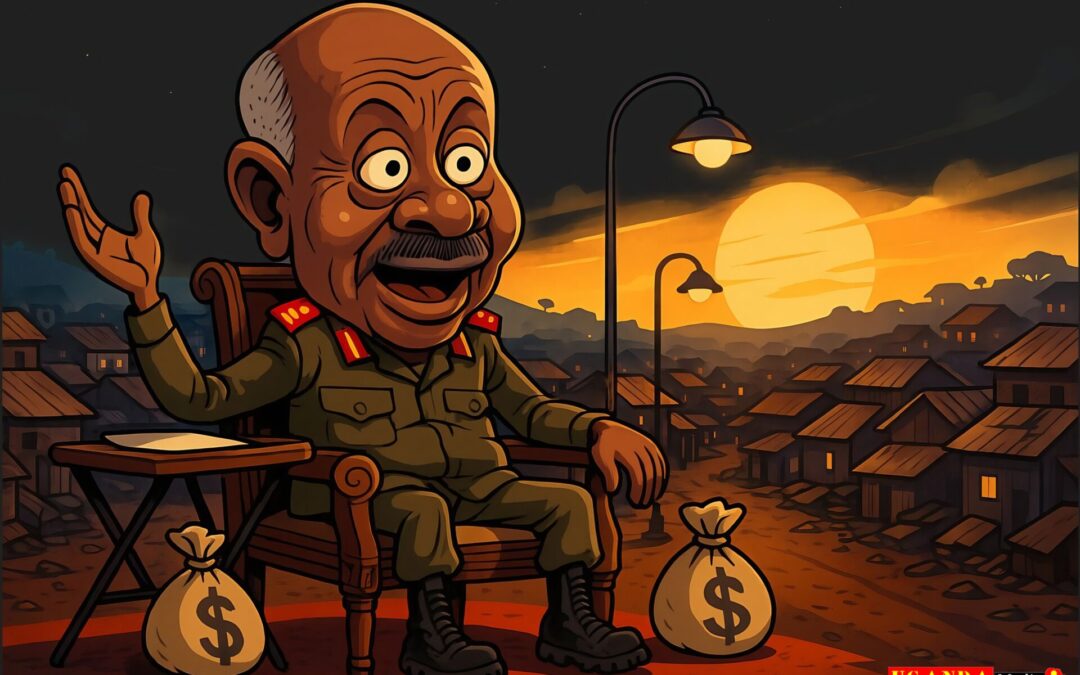
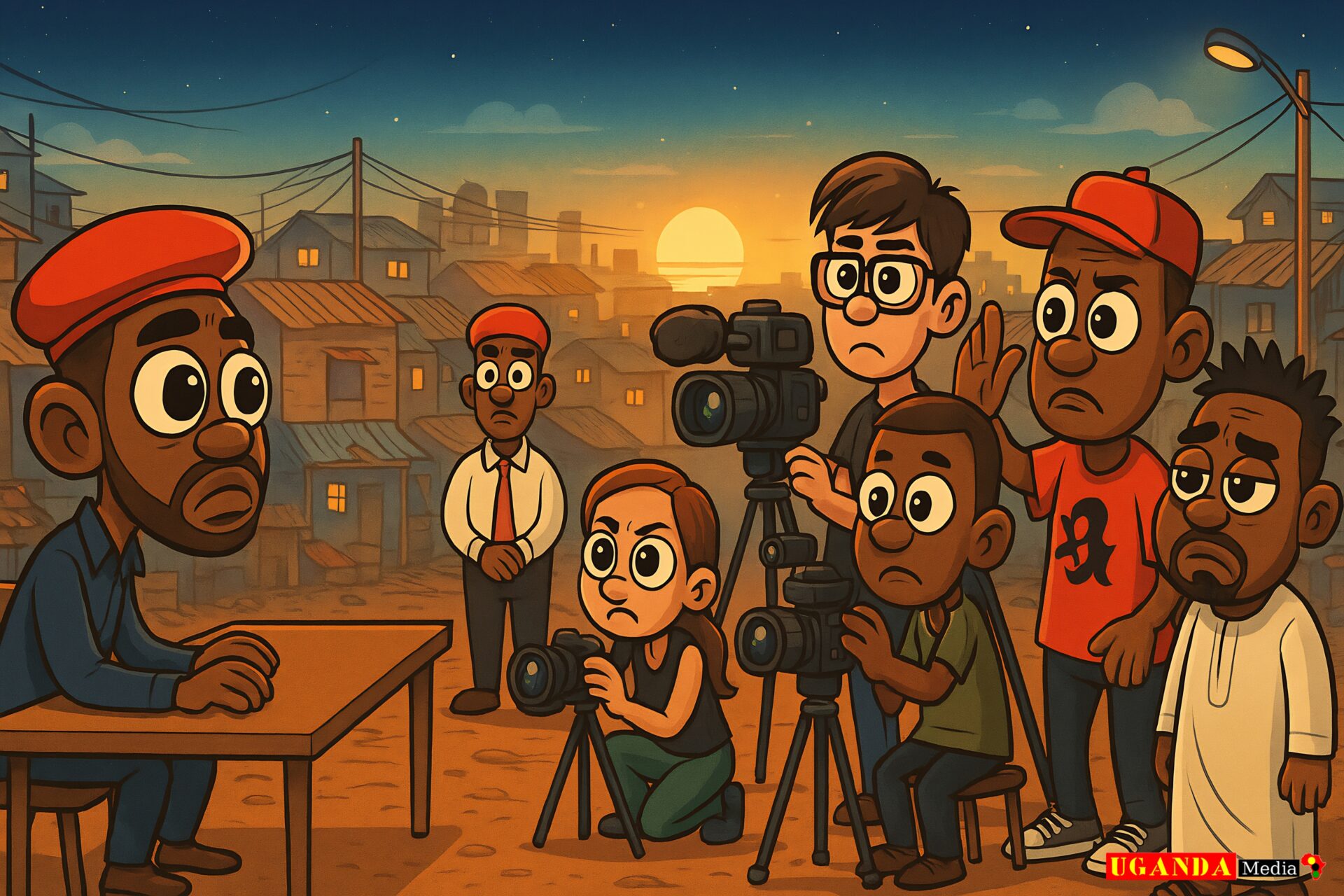
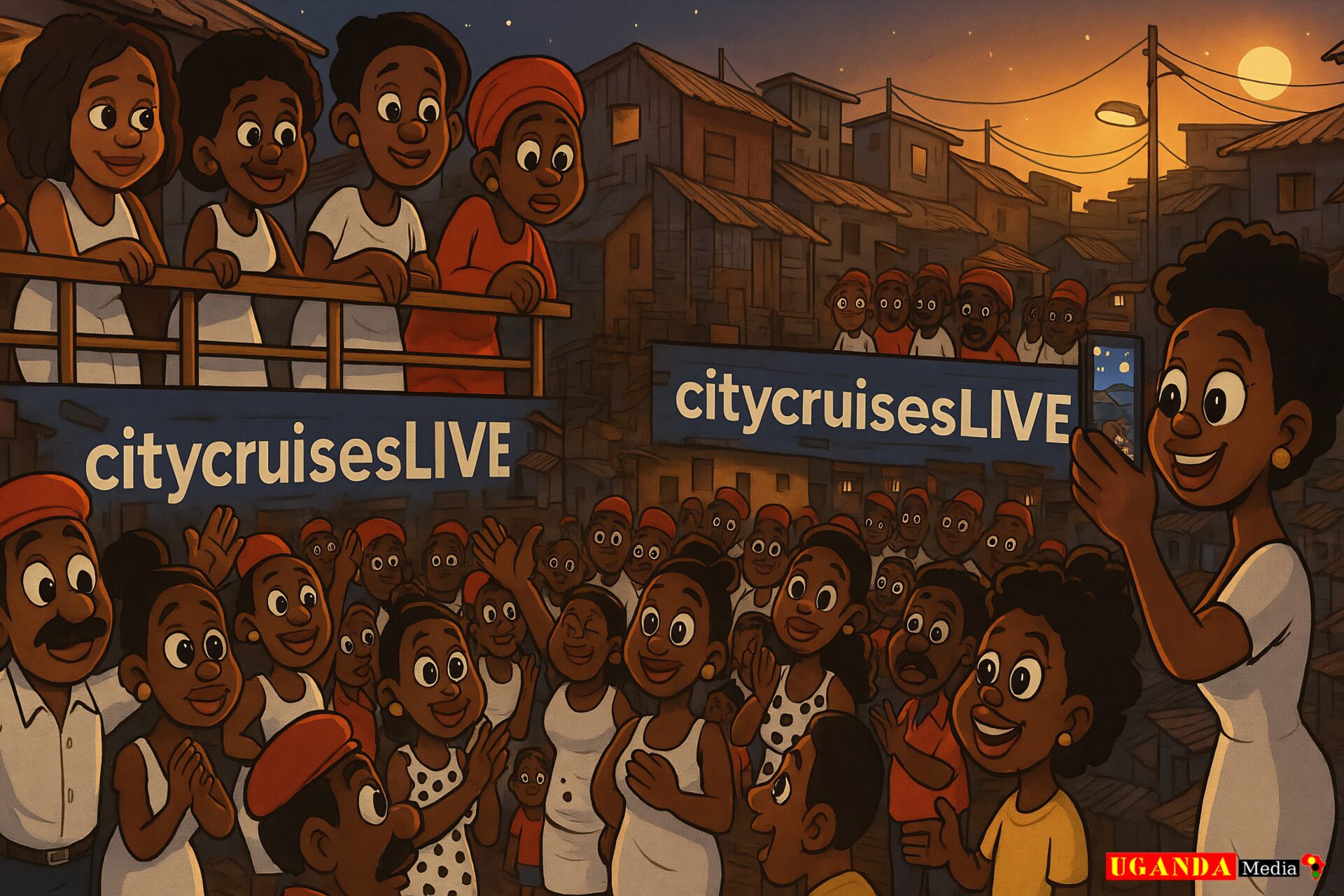 Second, it exhausts the energy of dissent. The immense energy, resources, and passion that should be directed outward—toward challenging the regime’s failures on healthcare, education, and corruption—are instead turned inward. Opposition leaders spend their time giving press conferences against each other, organising rival rallies, and battling for donor funds and media attention. This is energy siphoned away from the real struggle. It is a political pressure valve, allowing steam to escape harmlessly rather than building up to a force that could power real change. The regime watches, content, as its rivals busy themselves with personal vendettas and political one-upmanship.
Second, it exhausts the energy of dissent. The immense energy, resources, and passion that should be directed outward—toward challenging the regime’s failures on healthcare, education, and corruption—are instead turned inward. Opposition leaders spend their time giving press conferences against each other, organising rival rallies, and battling for donor funds and media attention. This is energy siphoned away from the real struggle. It is a political pressure valve, allowing steam to escape harmlessly rather than building up to a force that could power real change. The regime watches, content, as its rivals busy themselves with personal vendettas and political one-upmanship.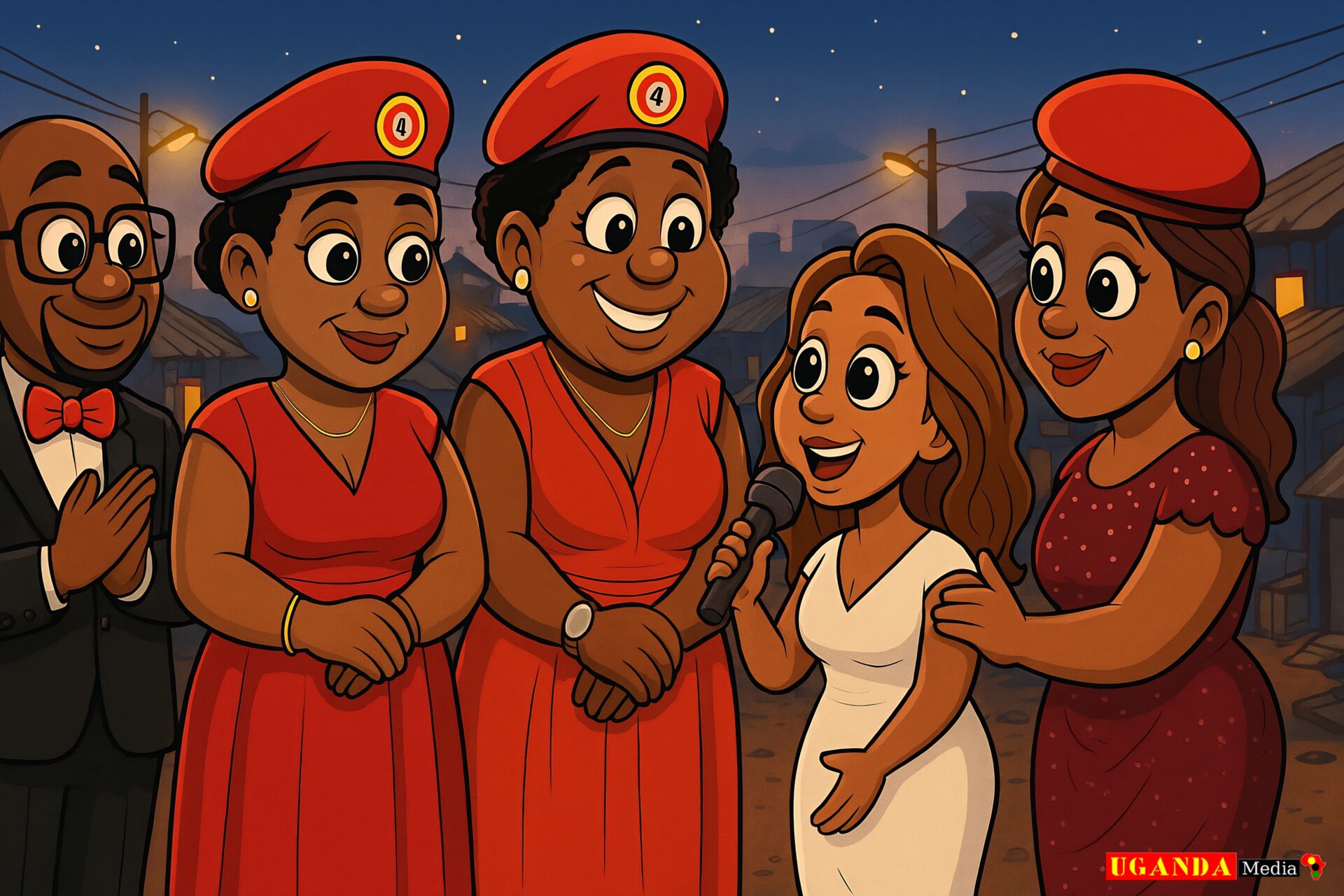 This disconnect is not a minor oversight; it is the entire point of the system. The regime, and the opposition that plays by its rules, has a shared interest in keeping the conversation, here, in the realm of political gossip and personality clashes. Why?
This disconnect is not a minor oversight; it is the entire point of the system. The regime, and the opposition that plays by its rules, has a shared interest in keeping the conversation, here, in the realm of political gossip and personality clashes. Why? True leadership is not debated in television studios; it is demonstrated in action, in solidarity, and in shared struggle. It is the community health worker who volunteers to care for her neighbours when the government clinic has no drugs. It is the village elder who mediates a land dispute fairly, without demanding a bribe. It is the youth group in a slum that organises to collect its own rubbish because the city council has failed them.
True leadership is not debated in television studios; it is demonstrated in action, in solidarity, and in shared struggle. It is the community health worker who volunteers to care for her neighbours when the government clinic has no drugs. It is the village elder who mediates a land dispute fairly, without demanding a bribe. It is the youth group in a slum that organises to collect its own rubbish because the city council has failed them. Therefore, the solution cannot be found in replacing the rotten fish at the head. The entire pond needs to be drained. The alternative is to build societies based on direct community ownership and transparent, rotational responsibility.
Therefore, the solution cannot be found in replacing the rotten fish at the head. The entire pond needs to be drained. The alternative is to build societies based on direct community ownership and transparent, rotational responsibility. Therefore, the solution is not to find a better family to run the estate. The solution is to abolish the concept of the estate altogether.
Therefore, the solution is not to find a better family to run the estate. The solution is to abolish the concept of the estate altogether.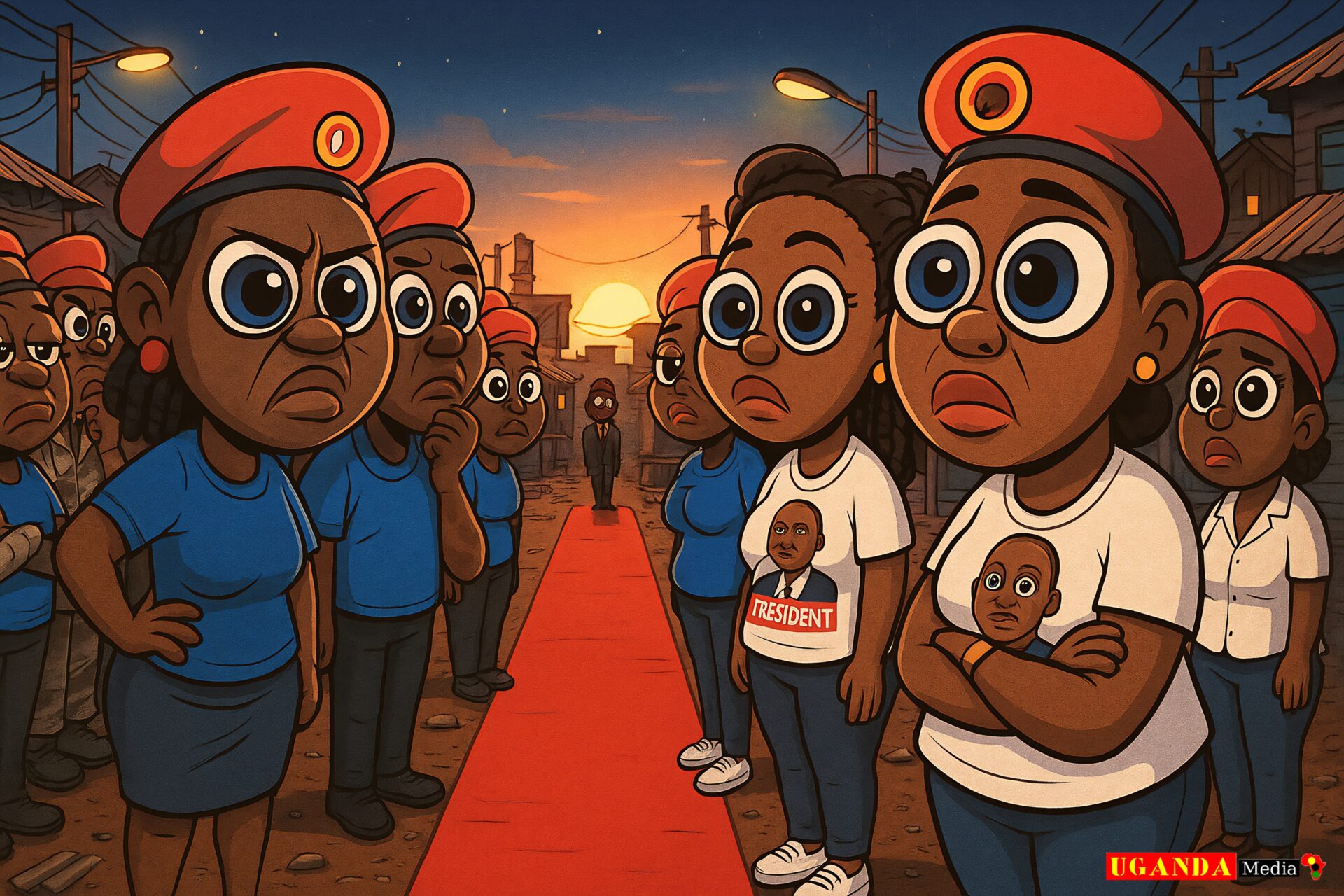 This failure is not an accident of personality or a minor lapse in judgement. It is the predictable, almost inevitable, result of trying to beat a system by its own rules. The current political structure is not a neutral arena; it is a carefully designed trap. It is a game of monopoly where one player already owns all the hotels on the board. Any new player who sits down to play, no matter how pure their intentions, is forced to use the same toxic currency and abide by the same rigged rules. The system is designed to corrupt, to co-opt, and to assimilate any challenge into its own dysfunctional logic.
This failure is not an accident of personality or a minor lapse in judgement. It is the predictable, almost inevitable, result of trying to beat a system by its own rules. The current political structure is not a neutral arena; it is a carefully designed trap. It is a game of monopoly where one player already owns all the hotels on the board. Any new player who sits down to play, no matter how pure their intentions, is forced to use the same toxic currency and abide by the same rigged rules. The system is designed to corrupt, to co-opt, and to assimilate any challenge into its own dysfunctional logic.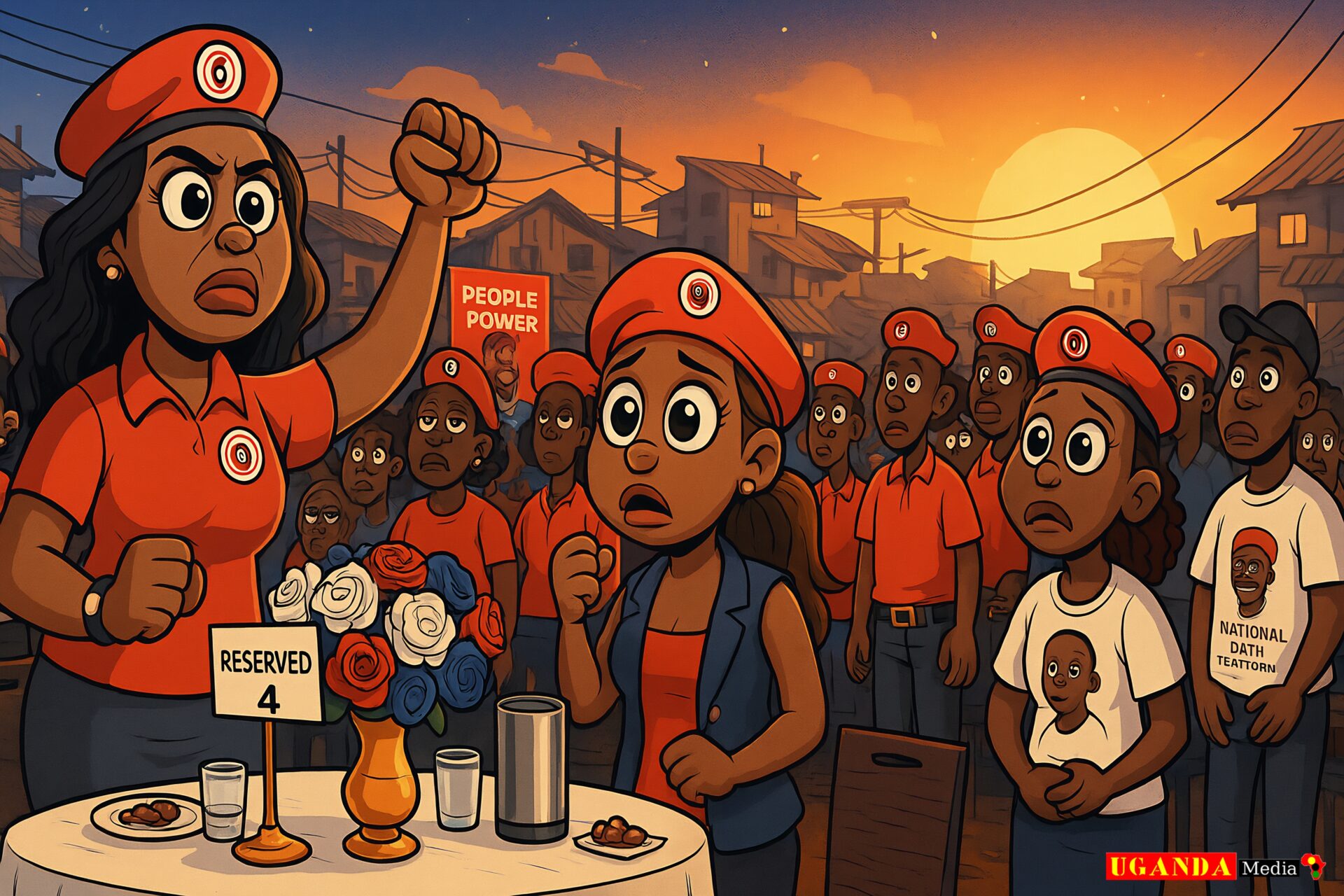 Think of it not as a democratic process, but as a carnival. For a few dizzying months, the country is saturated with colour, noise, and promise. Convoys roar through dusty villages, throwing out t-shirts and coins. Giant posters of smiling faces promise a future of milk and honey. Rallies blast music and fiery speeches. It is a thrilling distraction, a powerful illusion of change and participation. But when the last vote is (mis)counted and the carnival packs up and leaves town, the people are left standing amidst the litter and the debt, realising the thrilling show was just that—a show. The real rulers never left the stage; they merely directed the performance.
Think of it not as a democratic process, but as a carnival. For a few dizzying months, the country is saturated with colour, noise, and promise. Convoys roar through dusty villages, throwing out t-shirts and coins. Giant posters of smiling faces promise a future of milk and honey. Rallies blast music and fiery speeches. It is a thrilling distraction, a powerful illusion of change and participation. But when the last vote is (mis)counted and the carnival packs up and leaves town, the people are left standing amidst the litter and the debt, realising the thrilling show was just that—a show. The real rulers never left the stage; they merely directed the performance.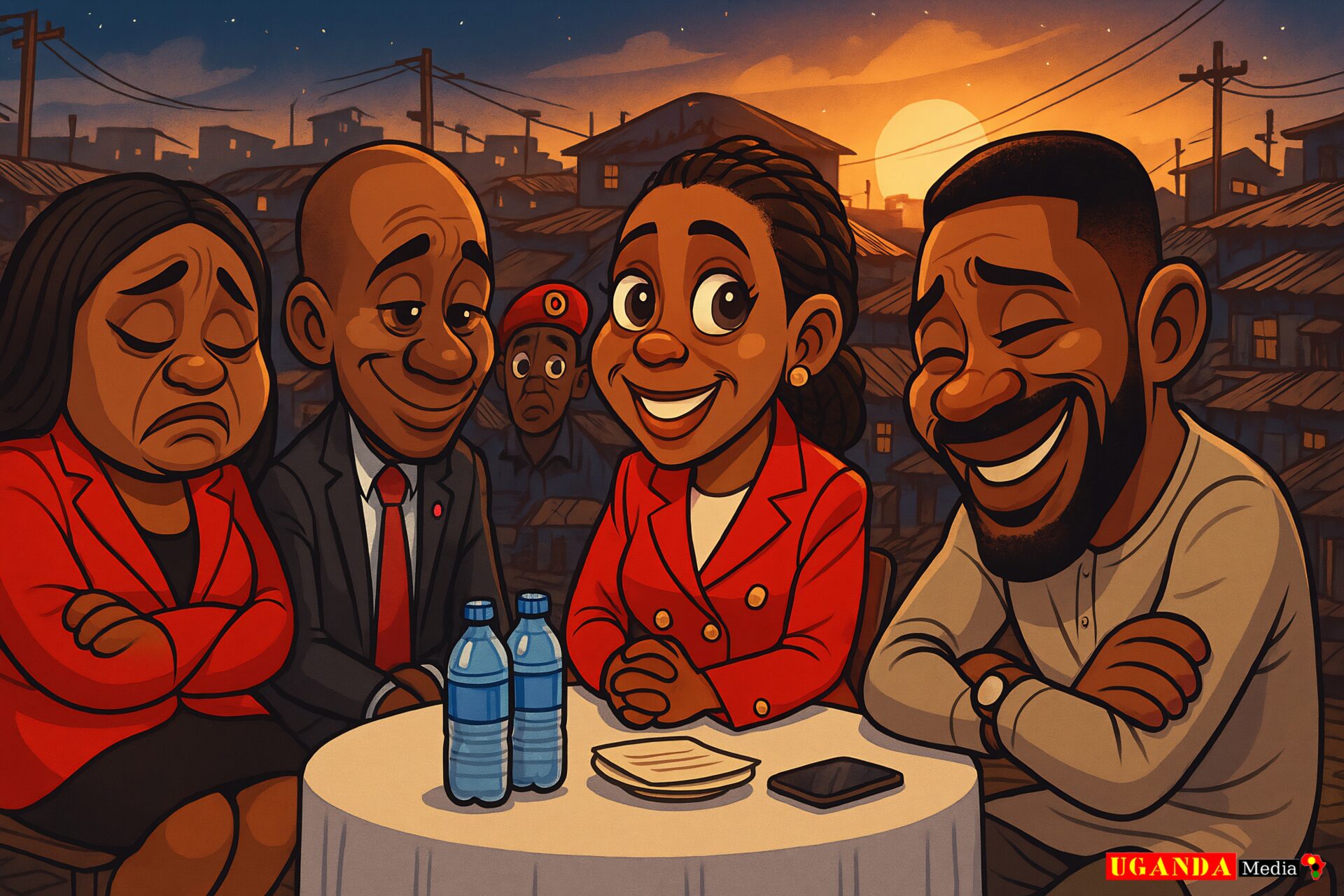 Therefore, the solution is not to beg them for better policies or more effective handouts. That is like begging the arsonist to bring a bigger bucket of water. The only true solution is to bankrupt the Poverty Industry itself by making ourselves ungovernable through self-reliance.
Therefore, the solution is not to beg them for better policies or more effective handouts. That is like begging the arsonist to bring a bigger bucket of water. The only true solution is to bankrupt the Poverty Industry itself by making ourselves ungovernable through self-reliance. The notion of “polite debate” in parliament or on television talk shows is a carefully managed spectacle designed to drain our energy and give the illusion of participation. It is a game where the rules are written by the powerful to ensure they never lose. You cannot debate a mosquito to stop sucking your blood. You must swat it, or better yet, drain the swamp it breeds in.
The notion of “polite debate” in parliament or on television talk shows is a carefully managed spectacle designed to drain our energy and give the illusion of participation. It is a game where the rules are written by the powerful to ensure they never lose. You cannot debate a mosquito to stop sucking your blood. You must swat it, or better yet, drain the swamp it breeds in.
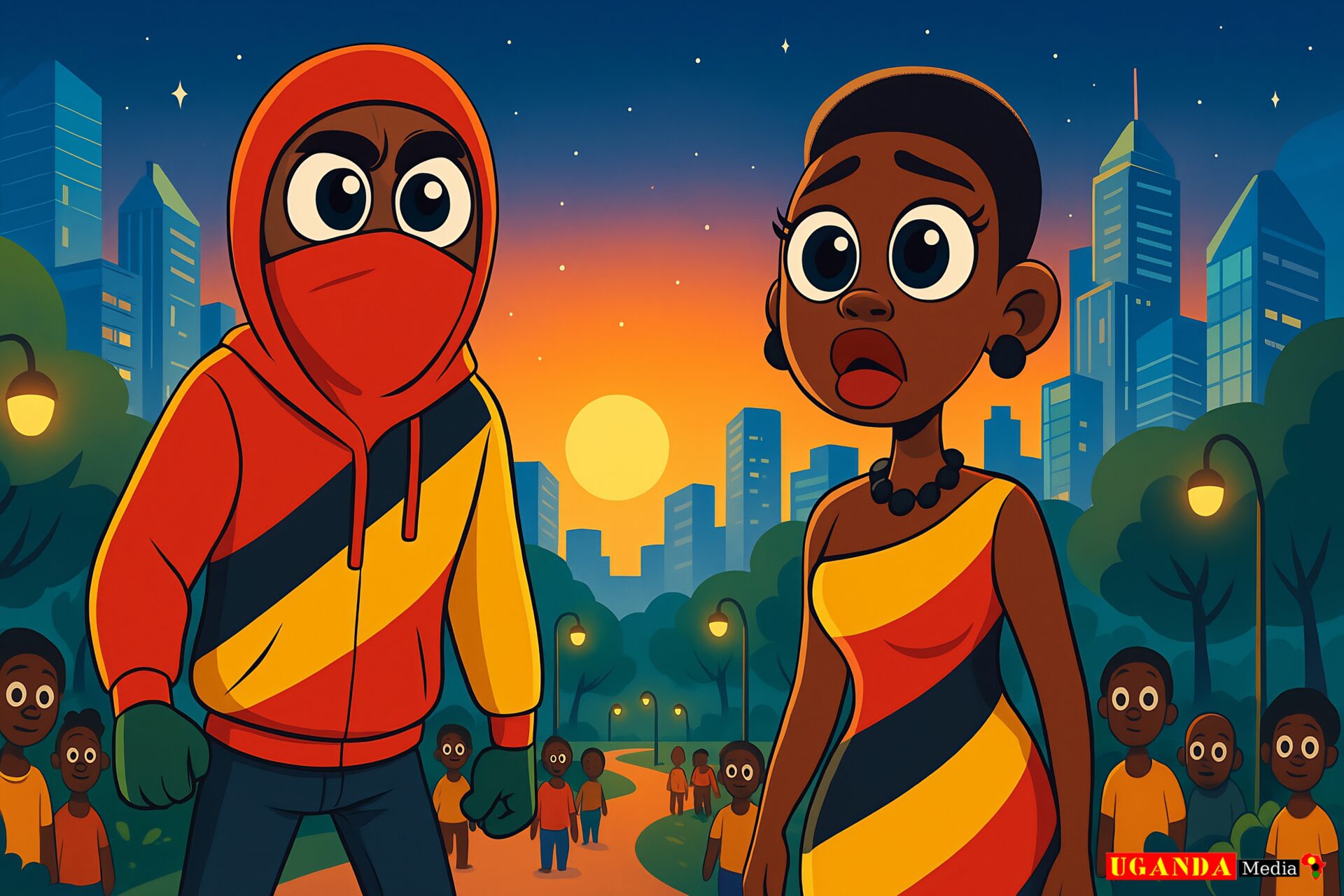 This rejection is not just a negative act; it is the positive act of building a new culture based on two powerful principles: Mutual Aid and Solidarity.
This rejection is not just a negative act; it is the positive act of building a new culture based on two powerful principles: Mutual Aid and Solidarity.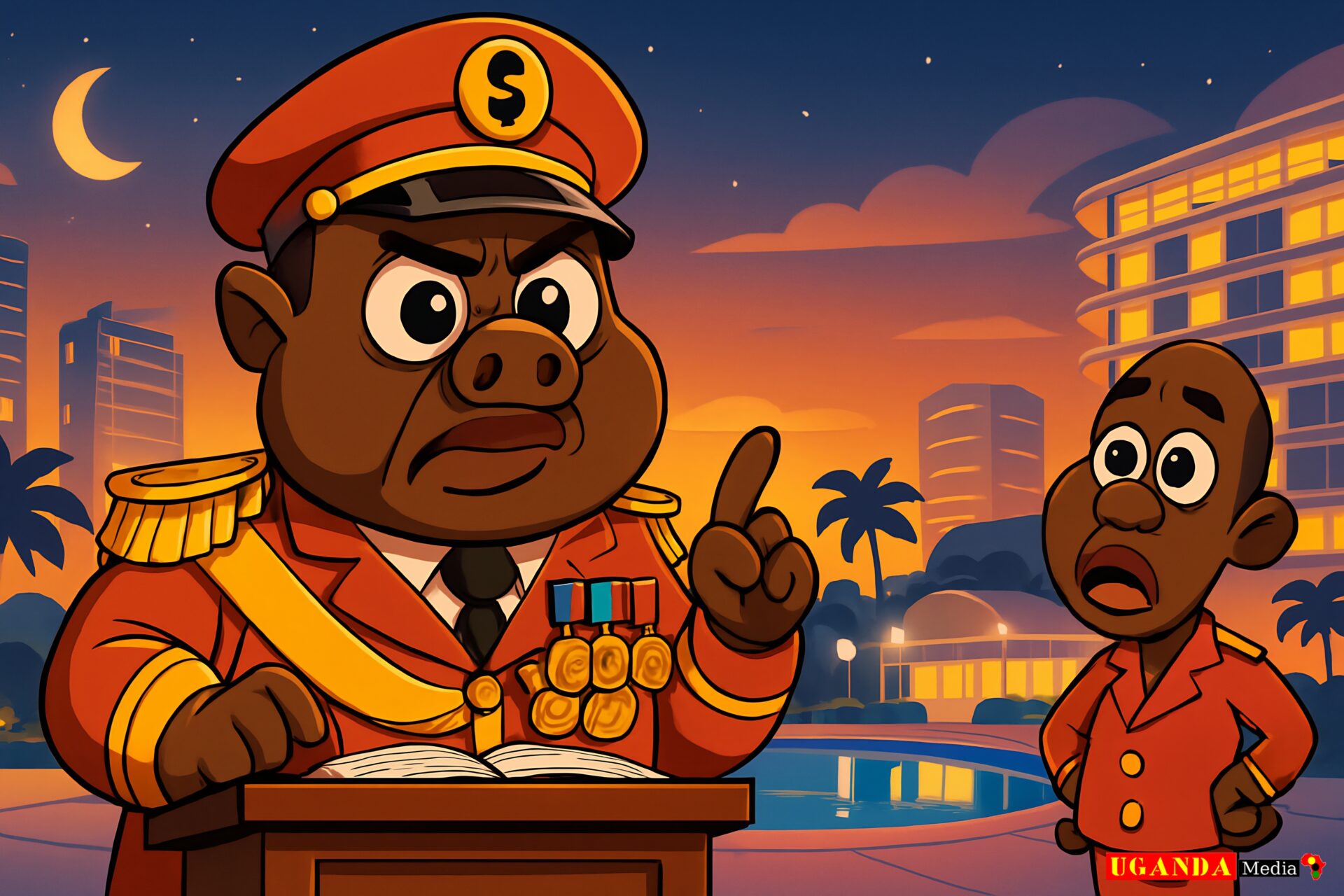 This is not a call to take over the state broadcaster. It is a call to render it irrelevant by building our own independent networks of communication. This is a form of direct action against the regime’s control of our minds.
This is not a call to take over the state broadcaster. It is a call to render it irrelevant by building our own independent networks of communication. This is a form of direct action against the regime’s control of our minds.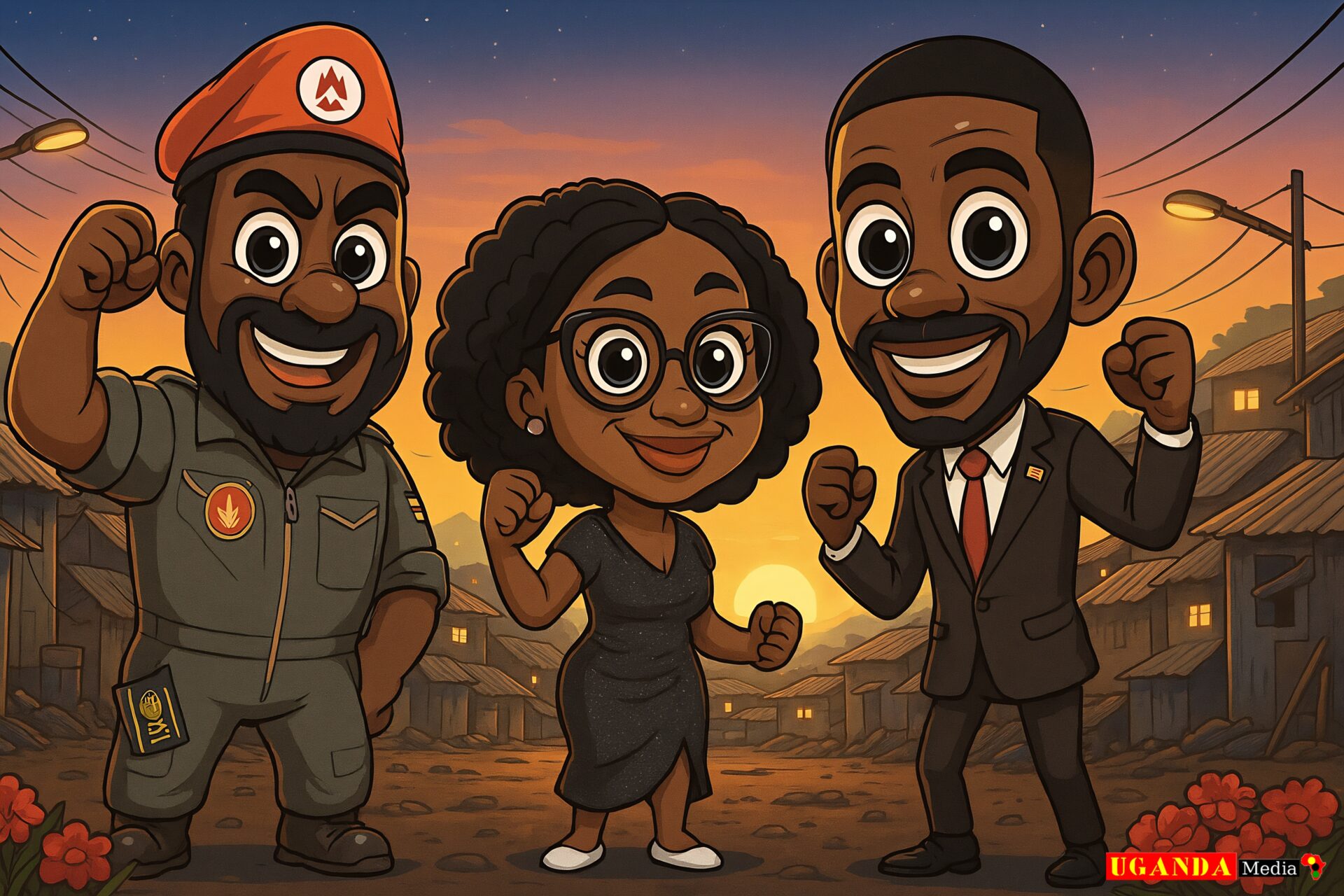 The notion that we must wait for a saviour or a perfect political party is a form of self-imposed slavery. It outsources our agency and our future to a class of people who have consistently proven they do not have our interests at heart. It keeps us looking up, when the real source of power is all around us.
The notion that we must wait for a saviour or a perfect political party is a form of self-imposed slavery. It outsources our agency and our future to a class of people who have consistently proven they do not have our interests at heart. It keeps us looking up, when the real source of power is all around us.